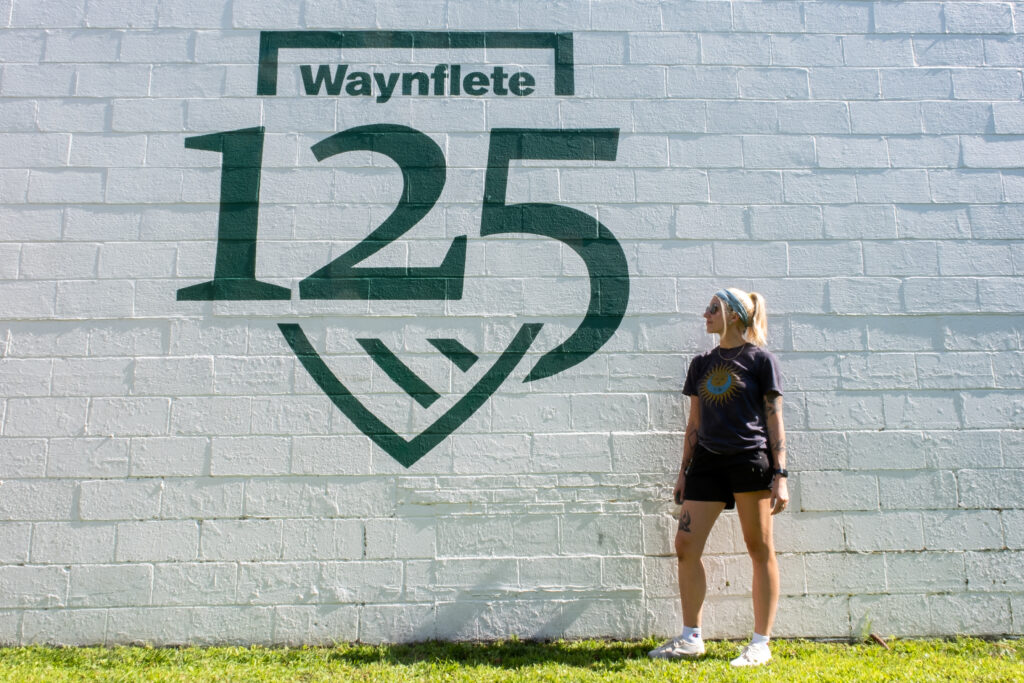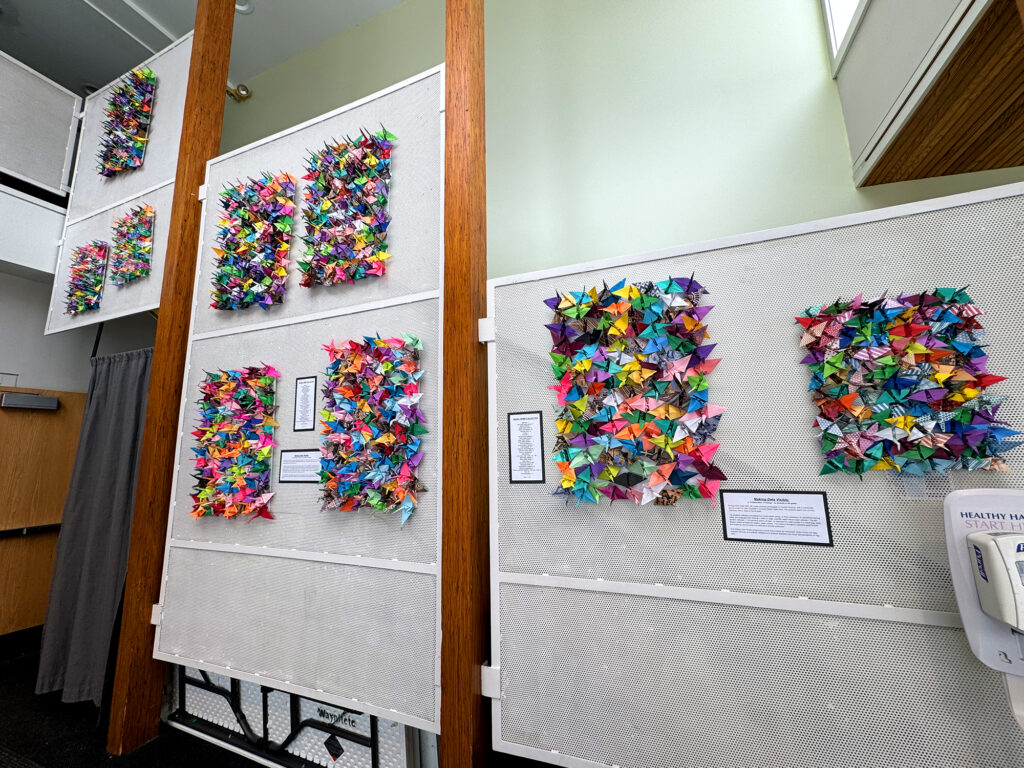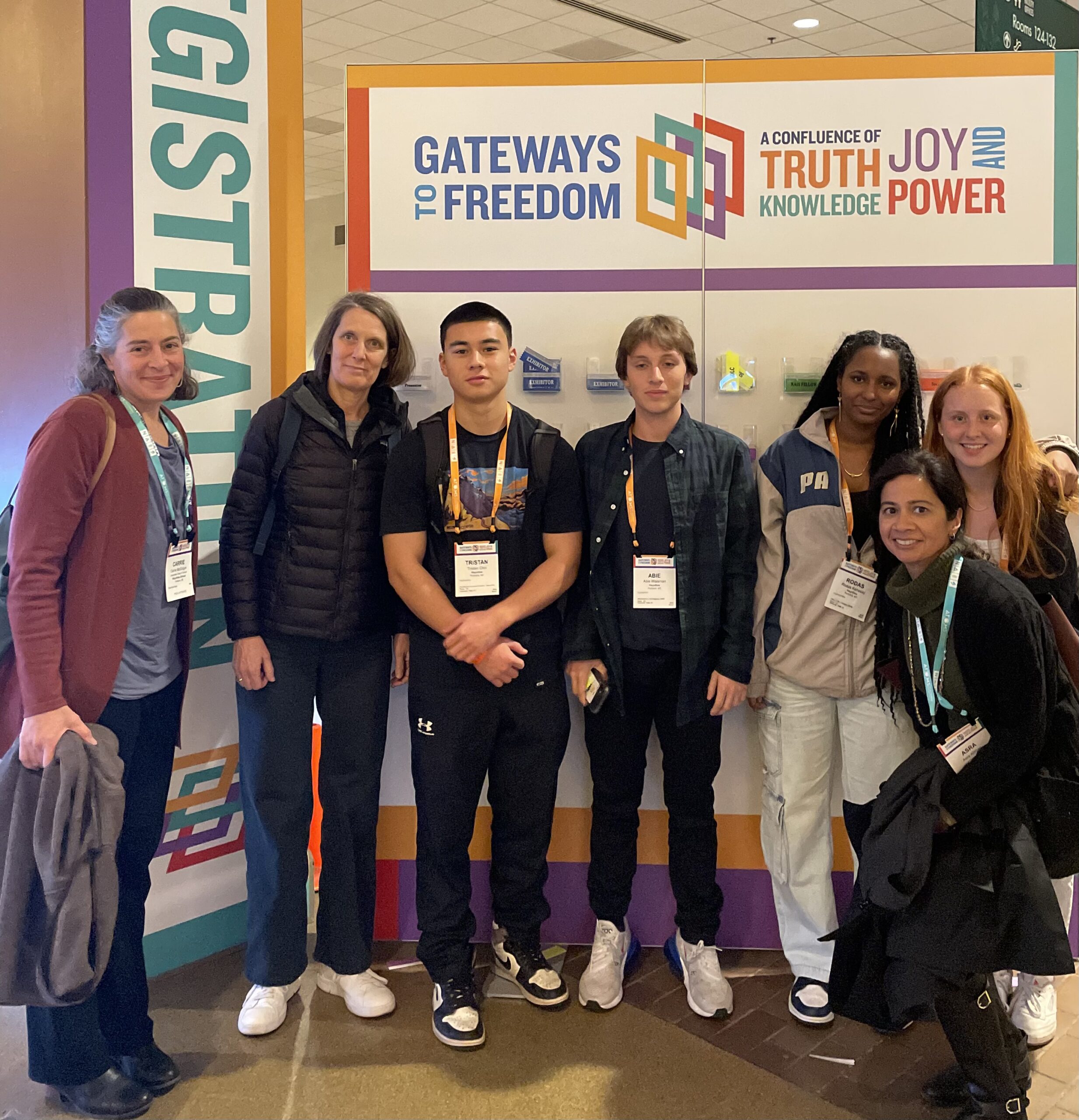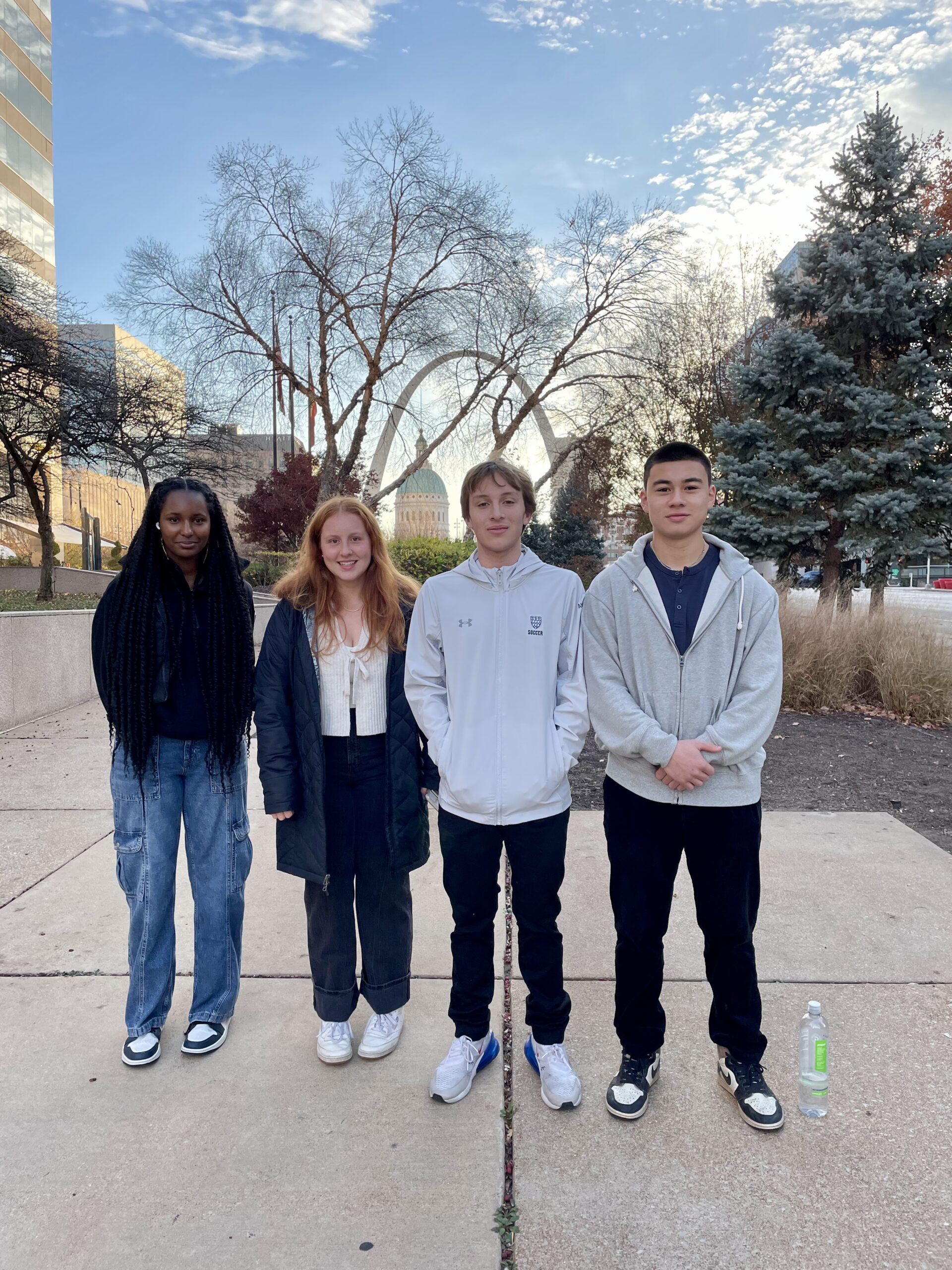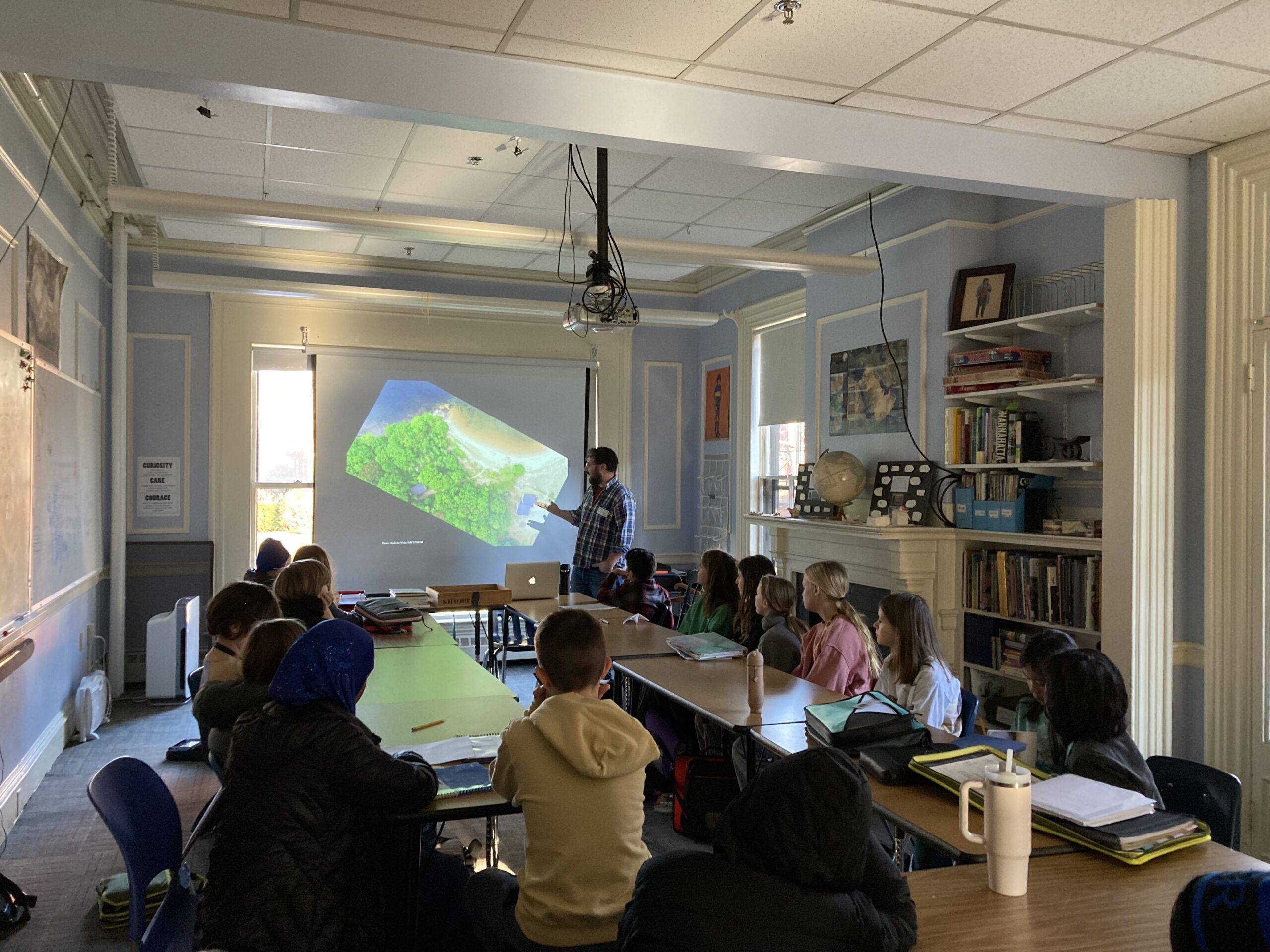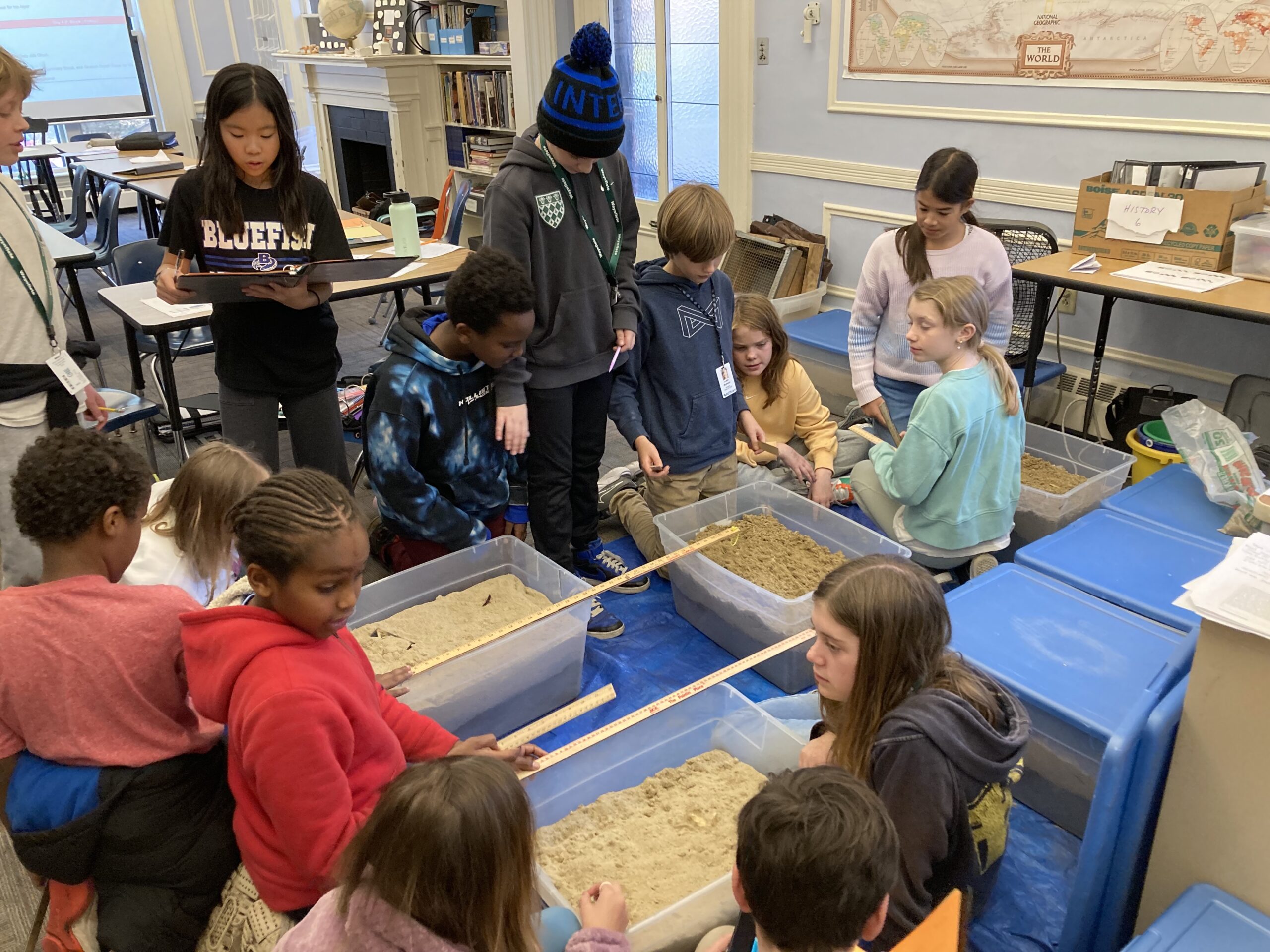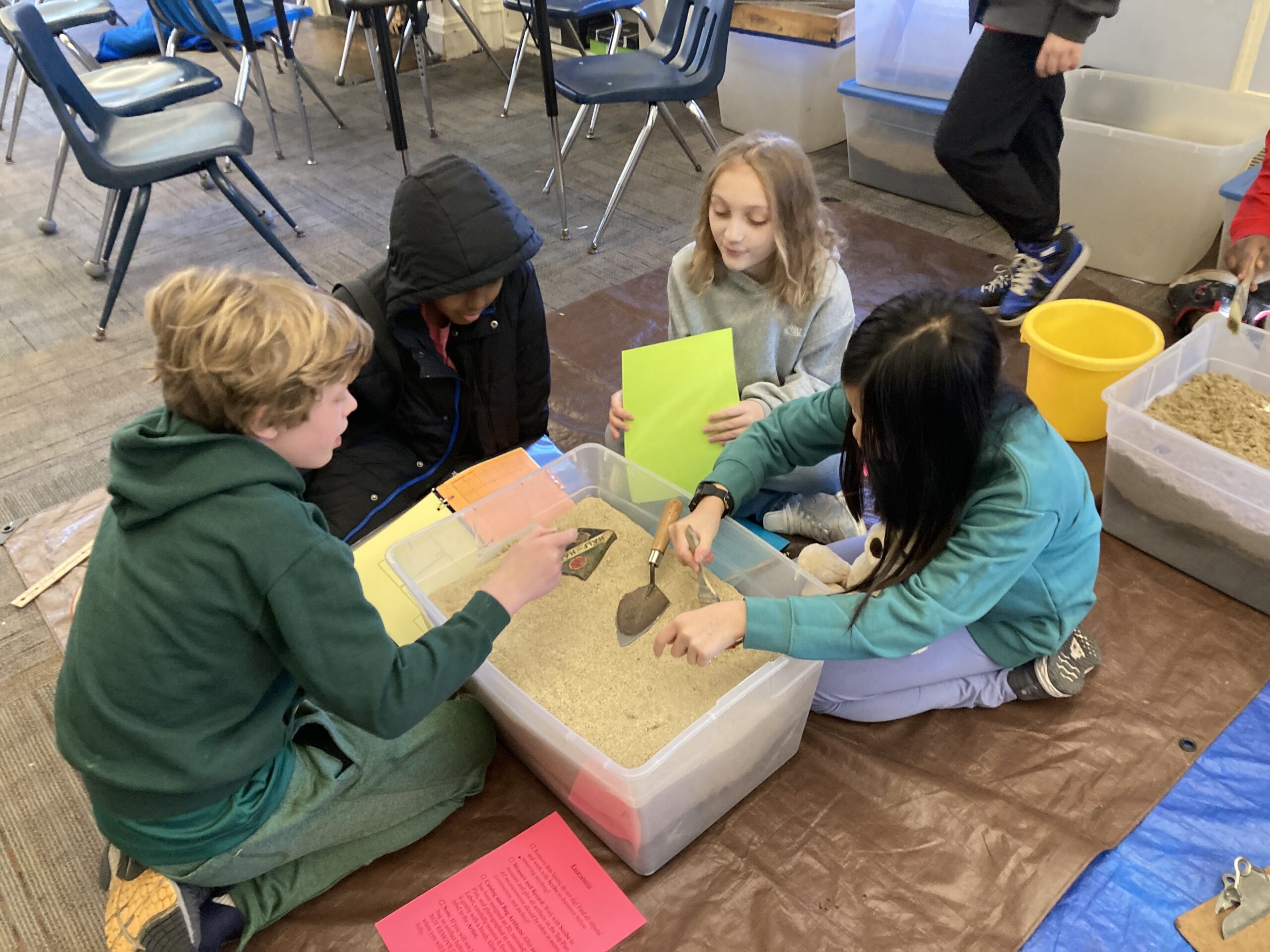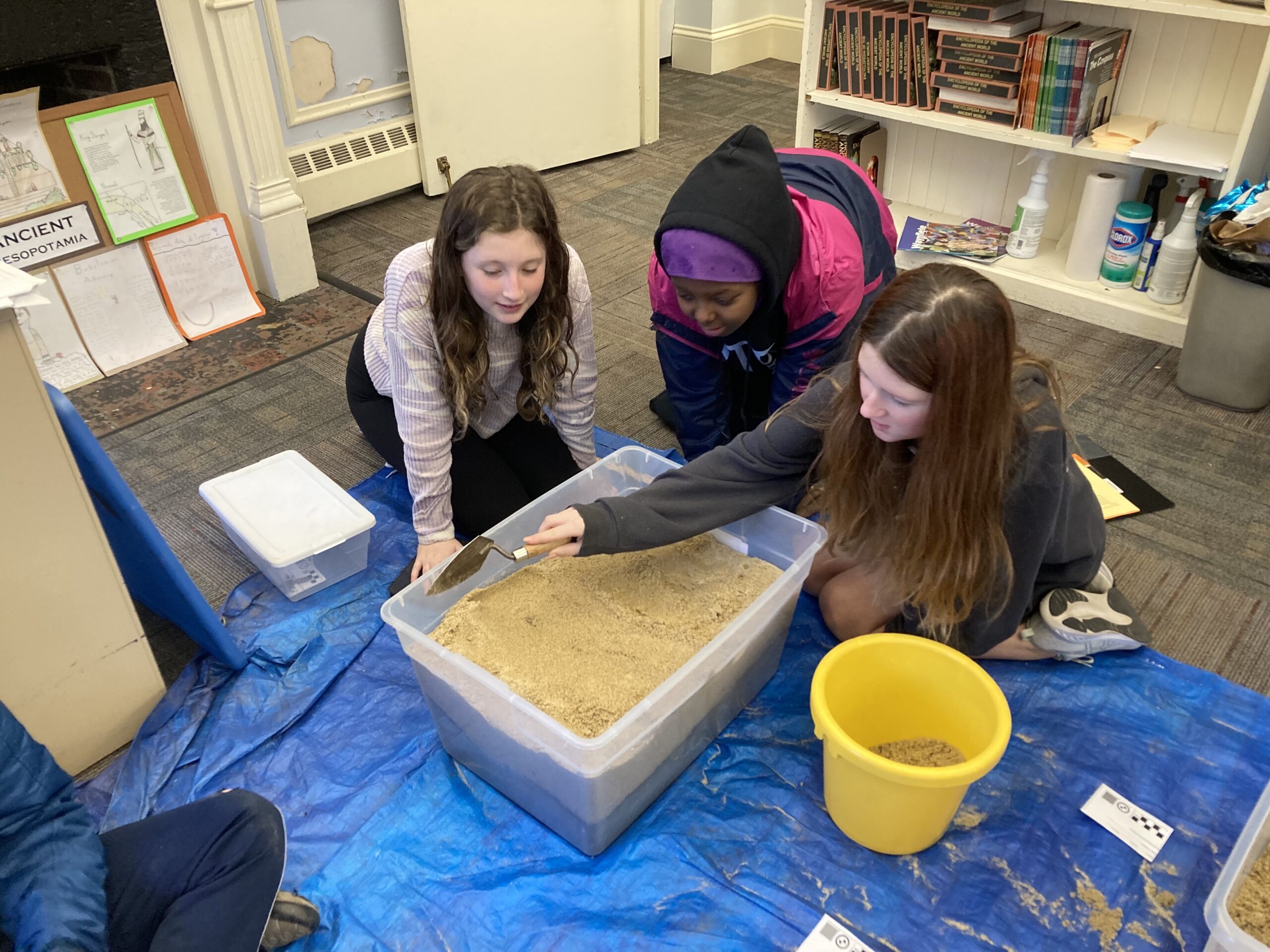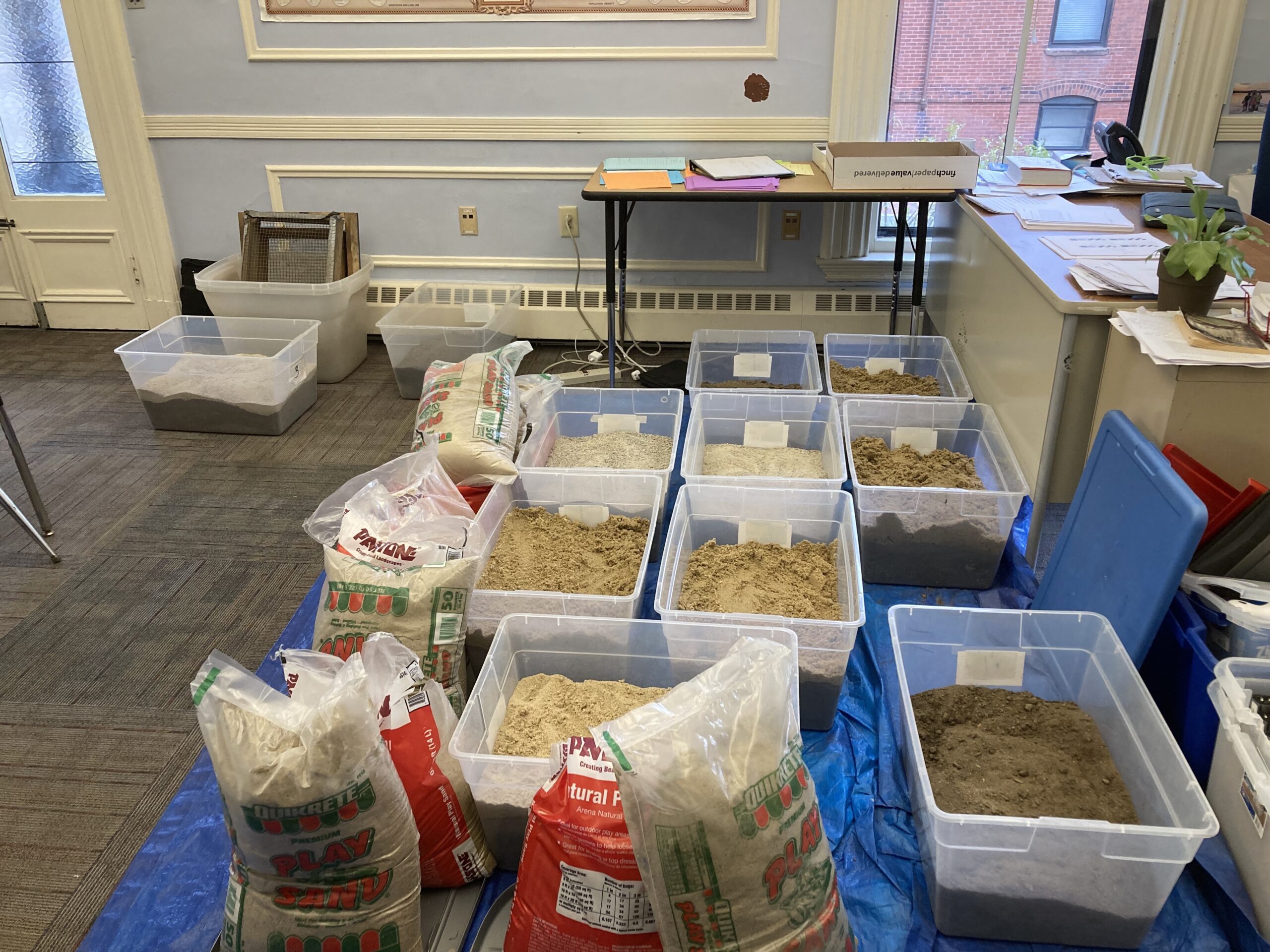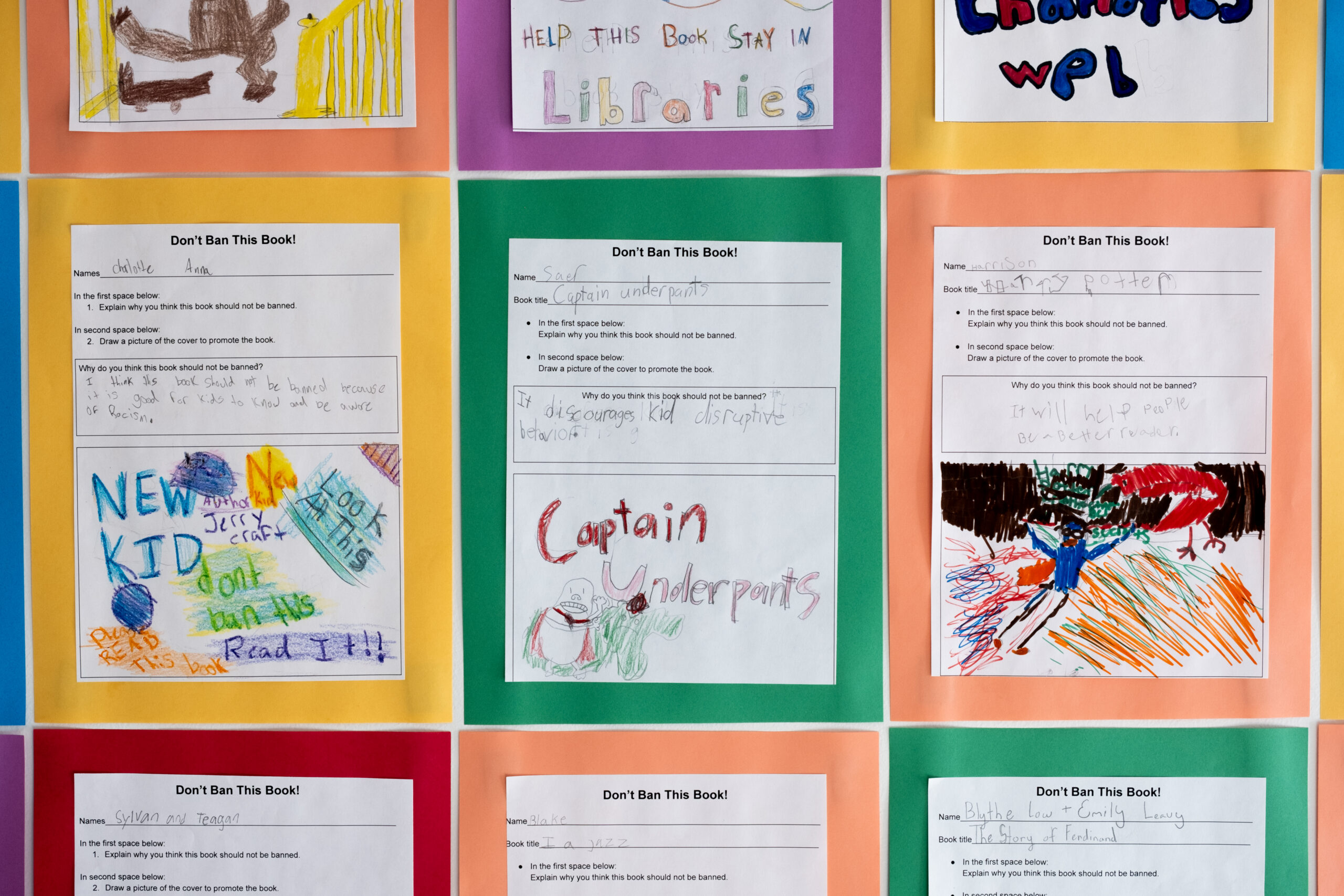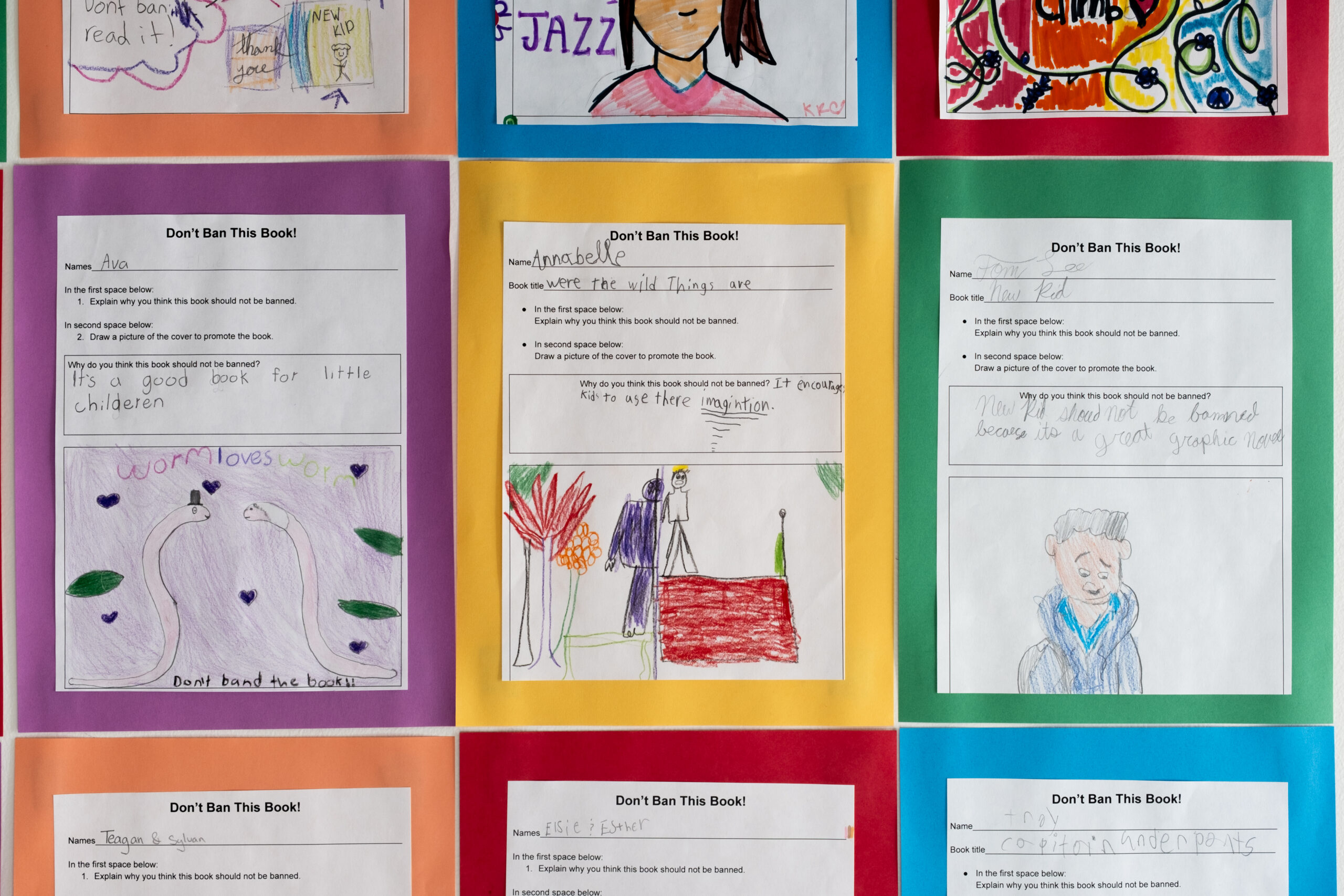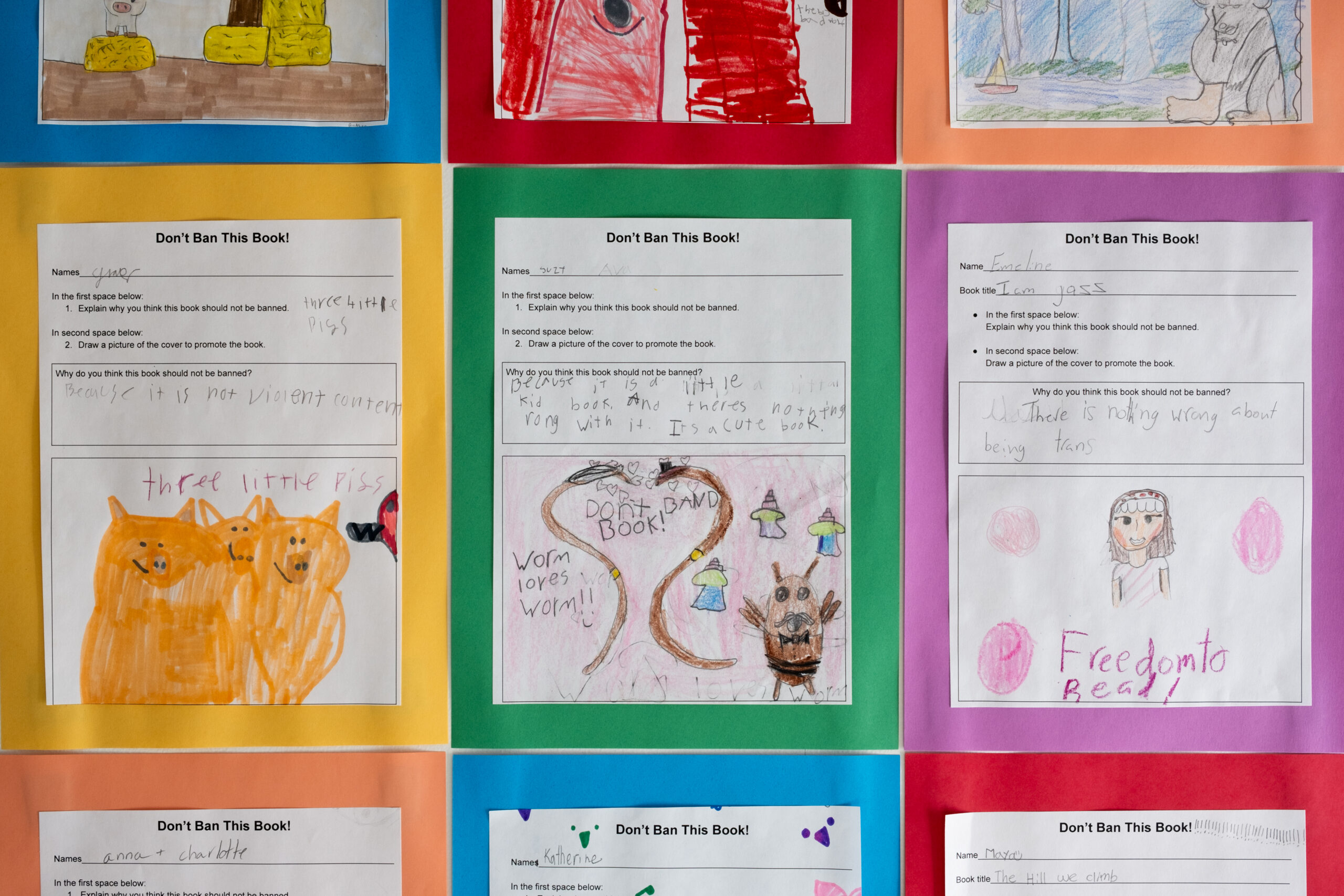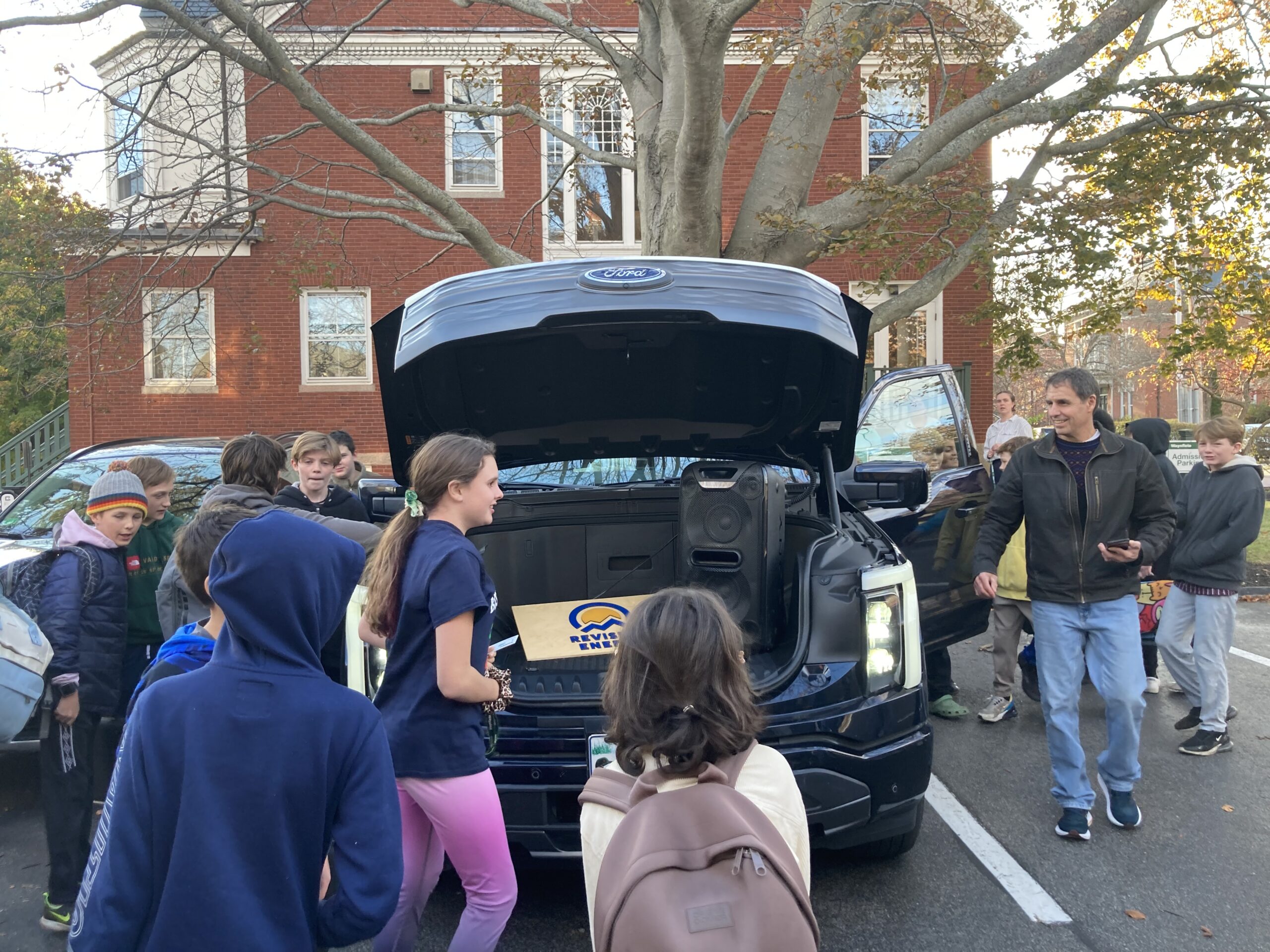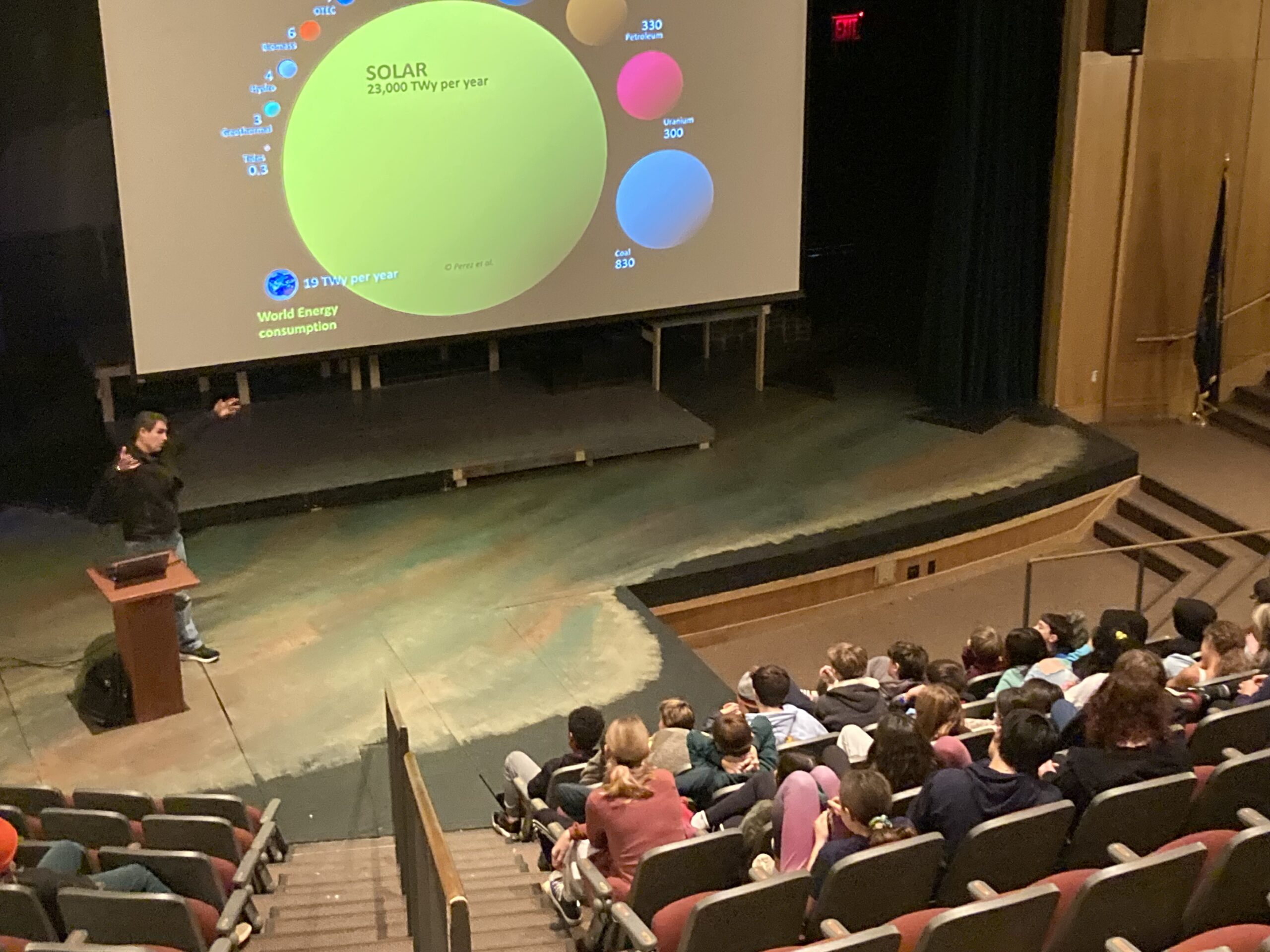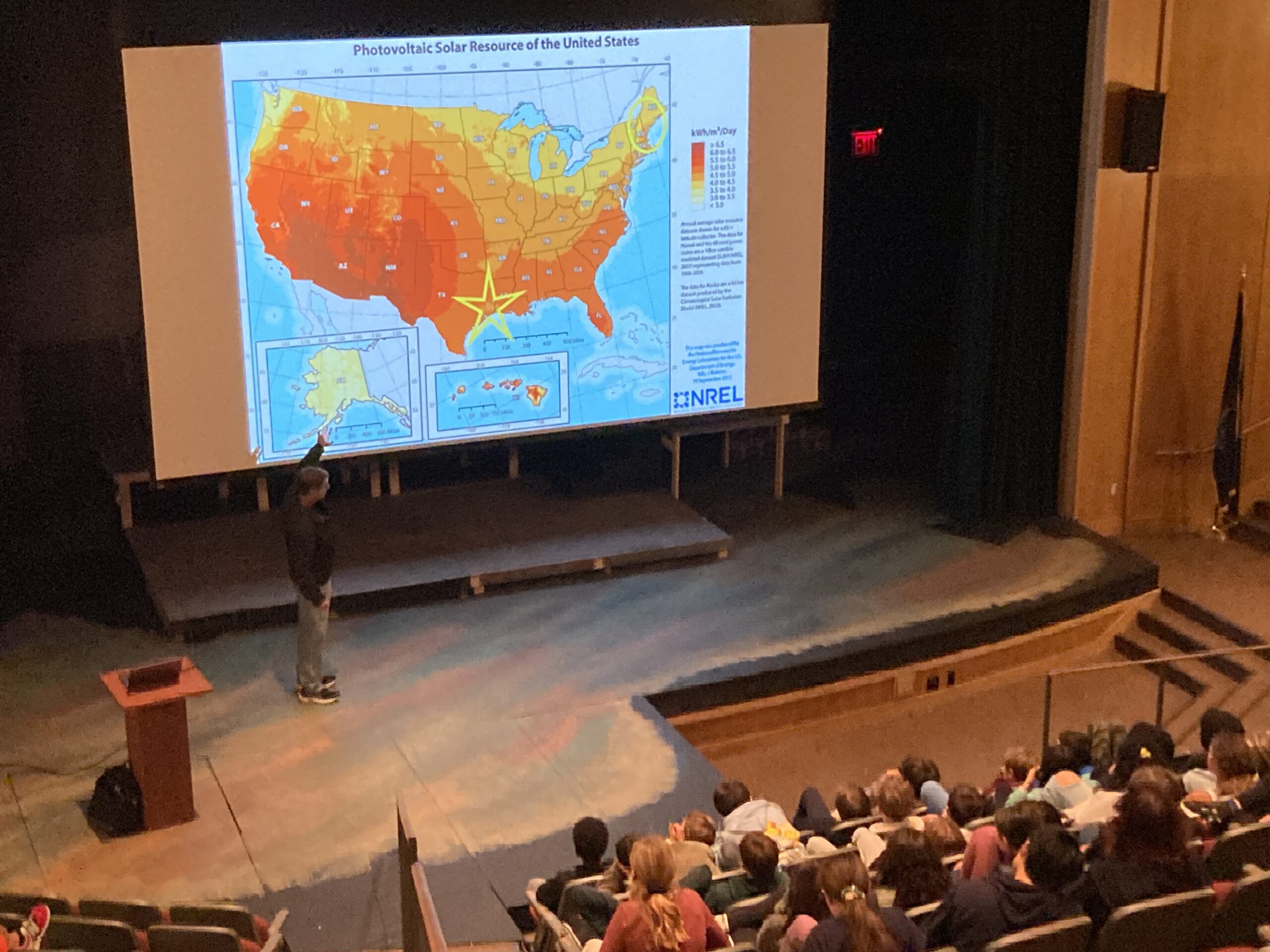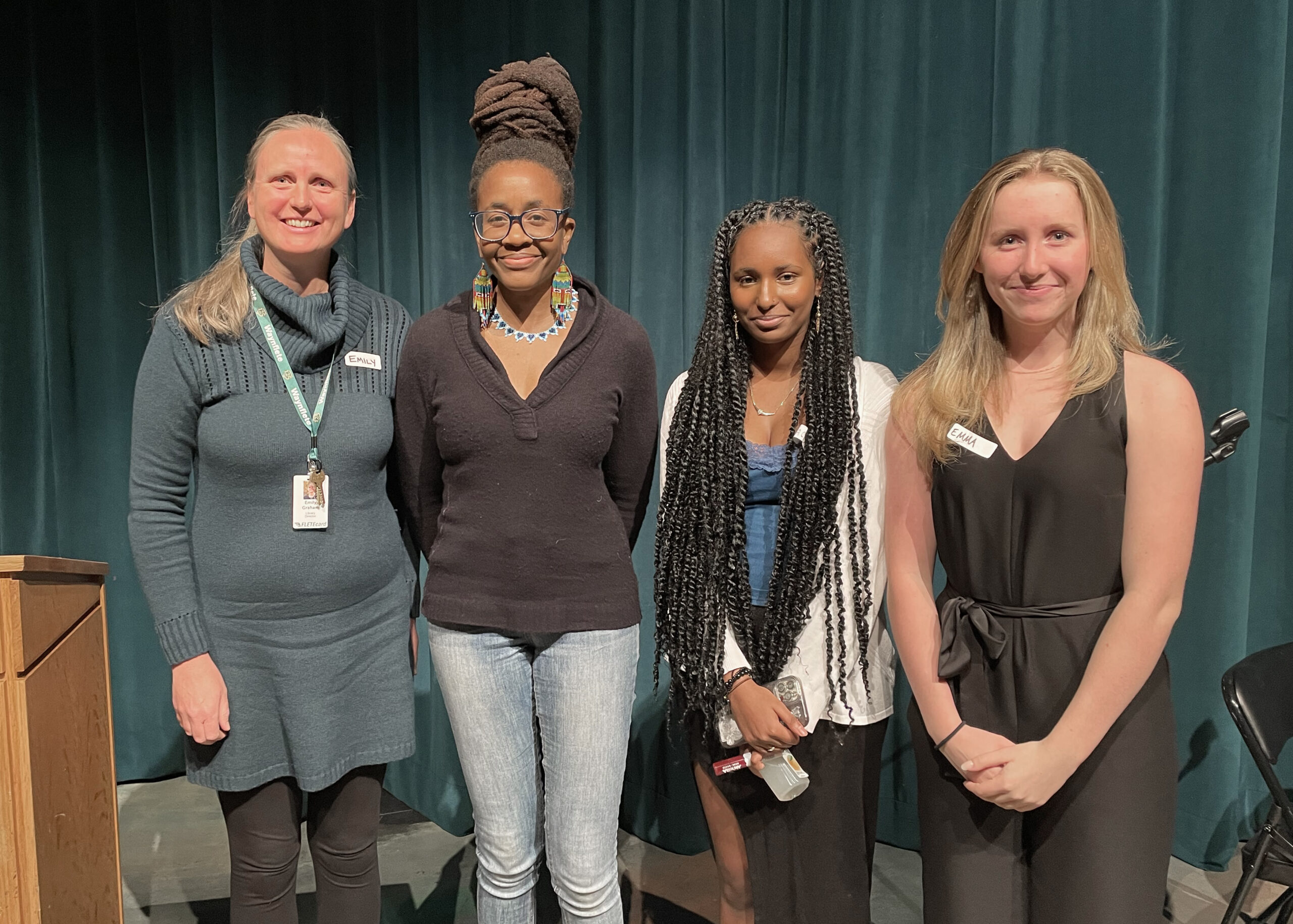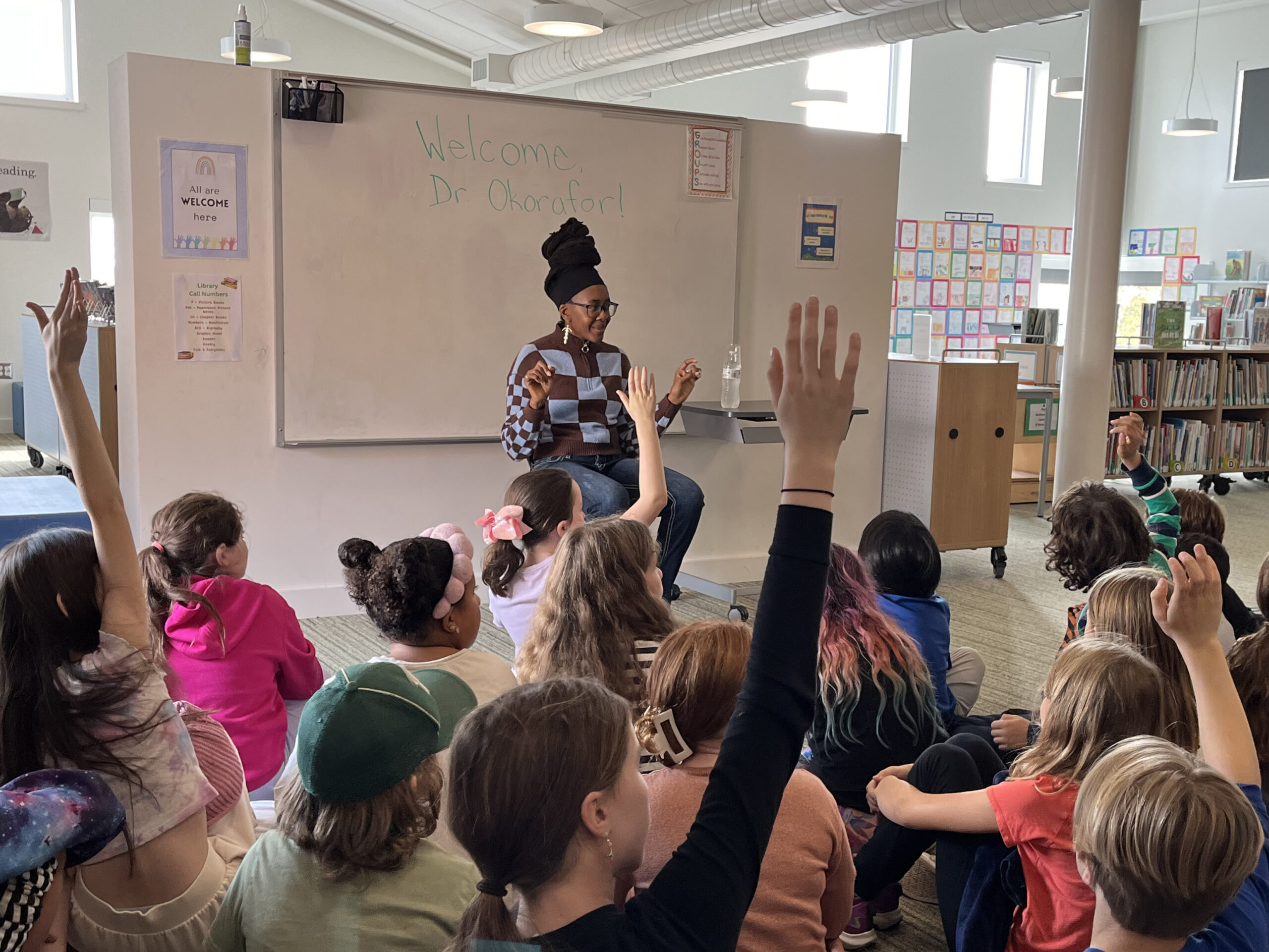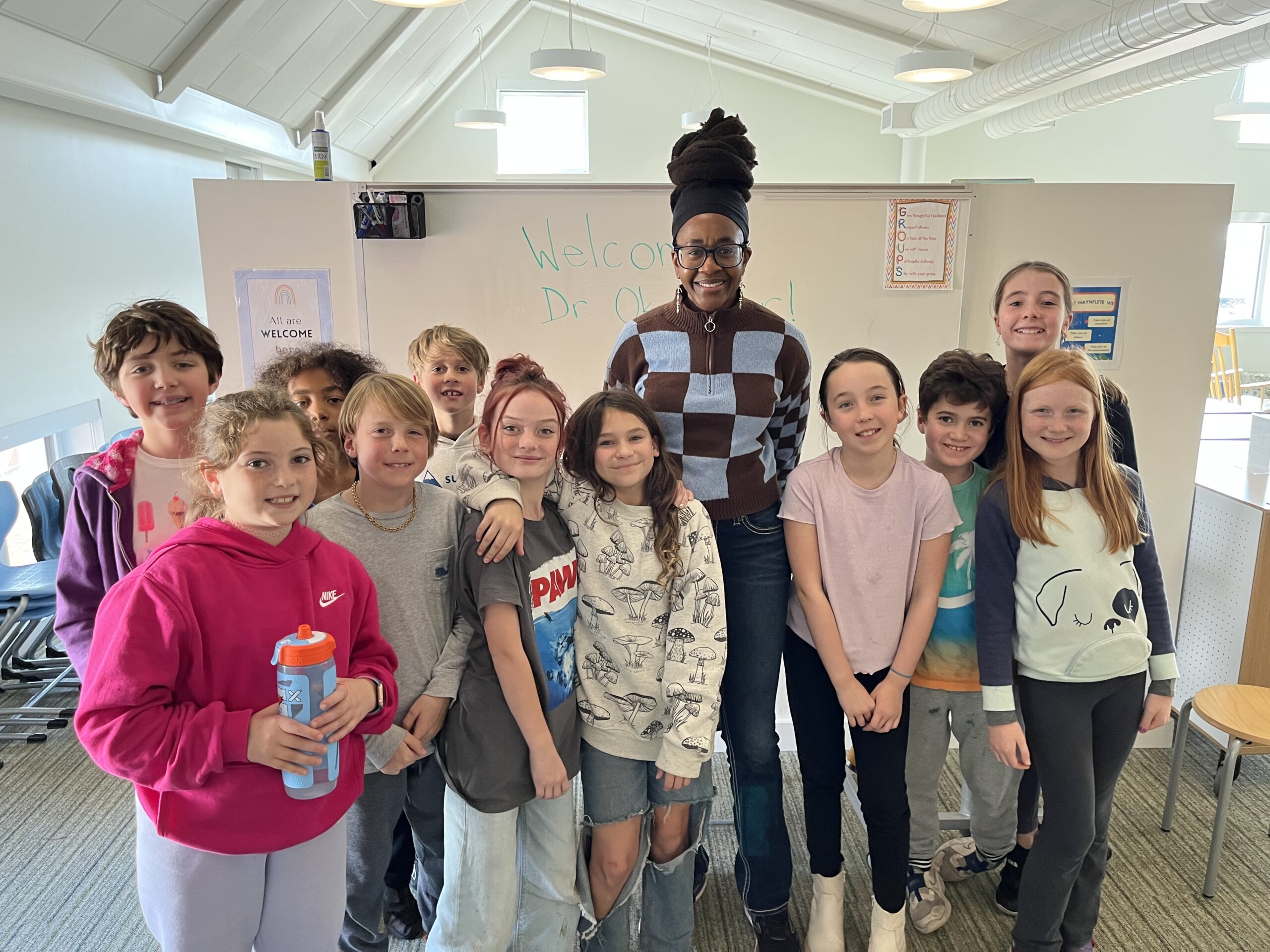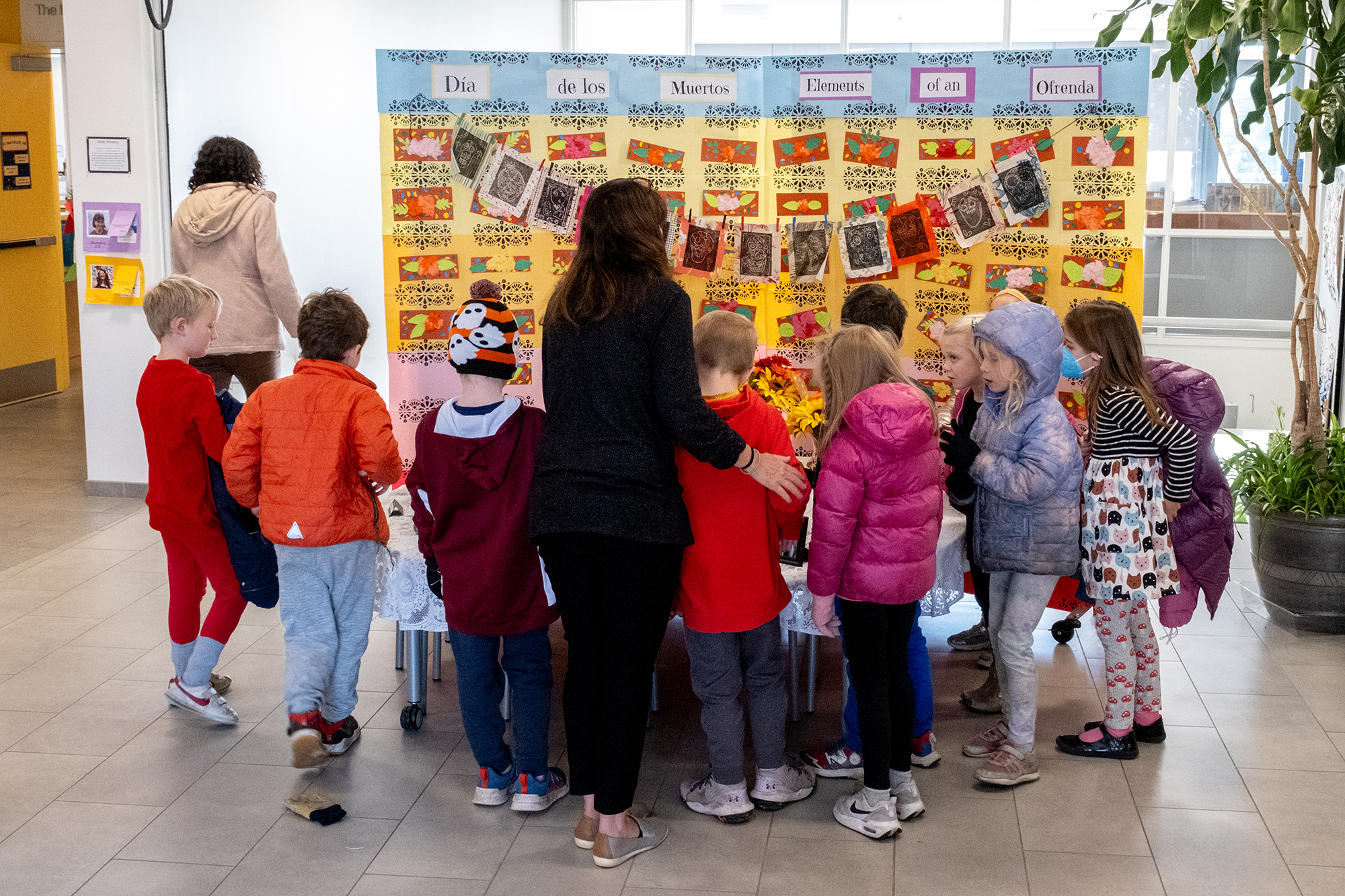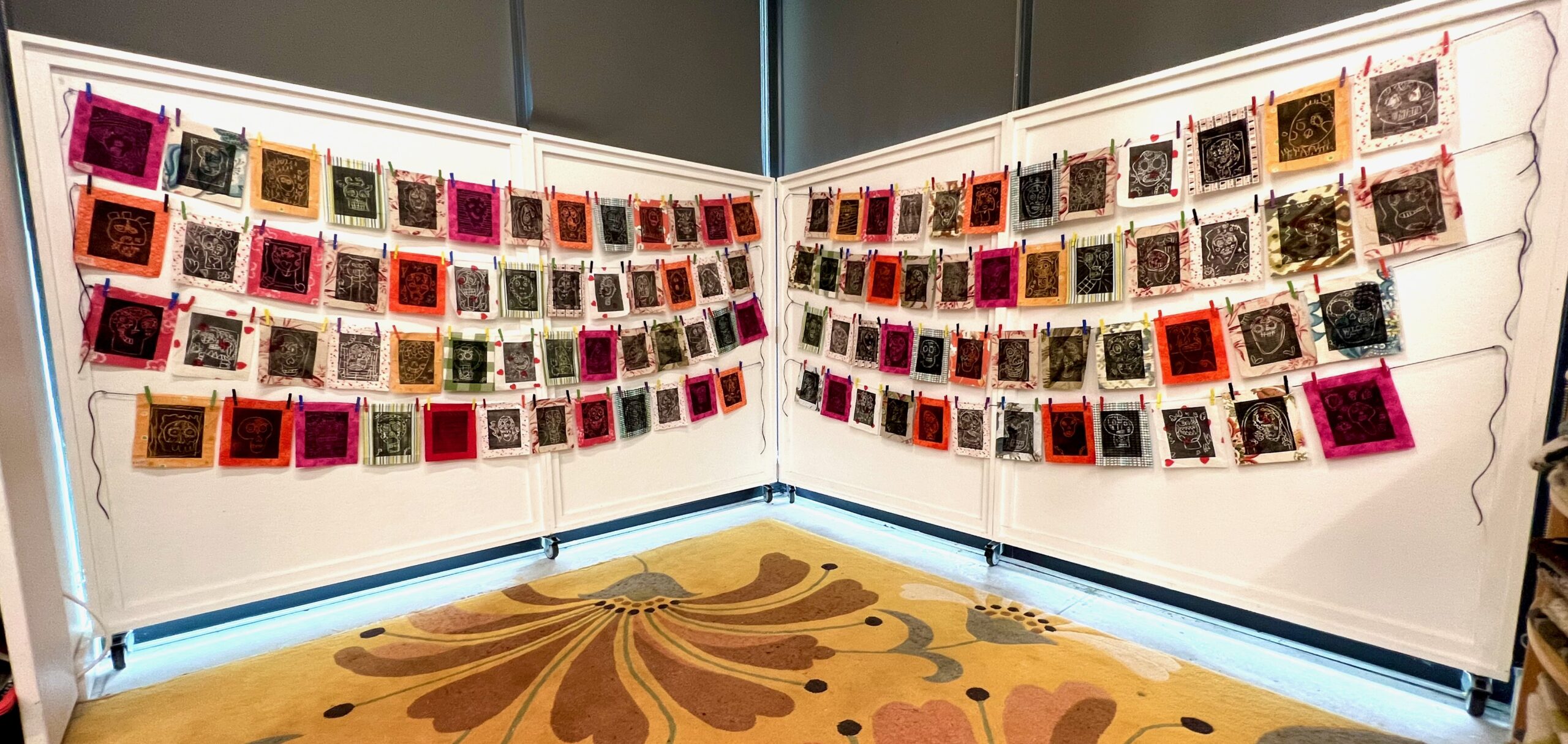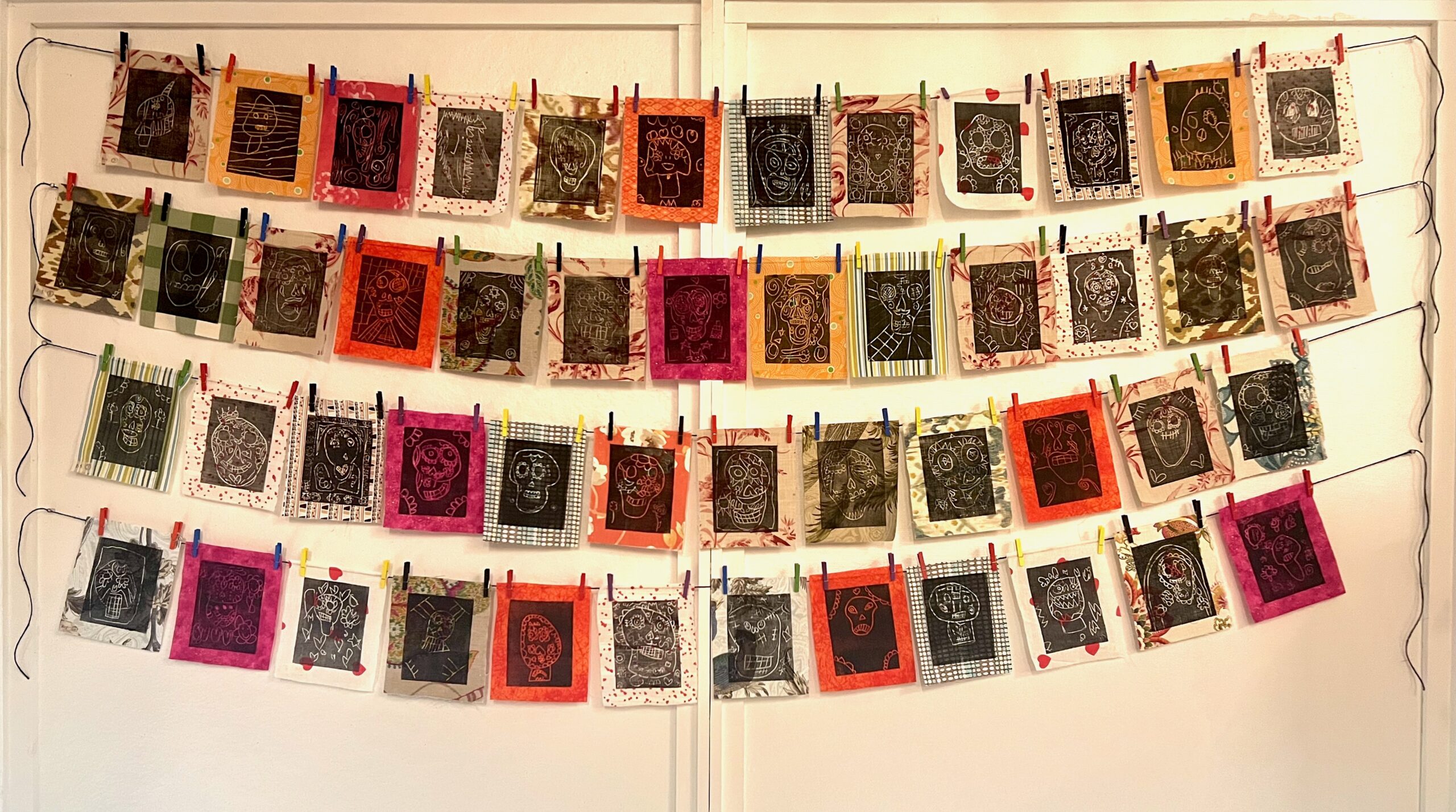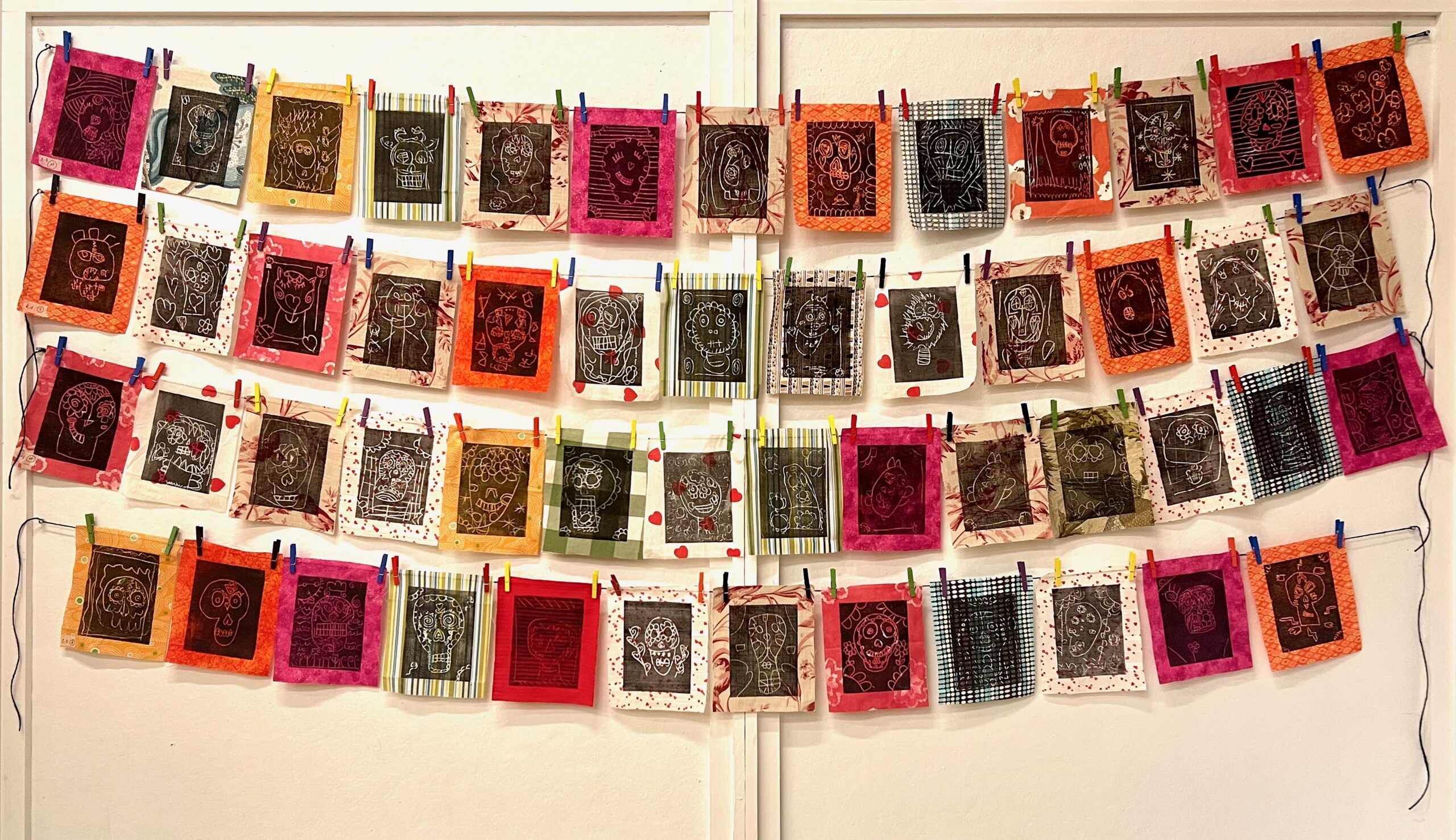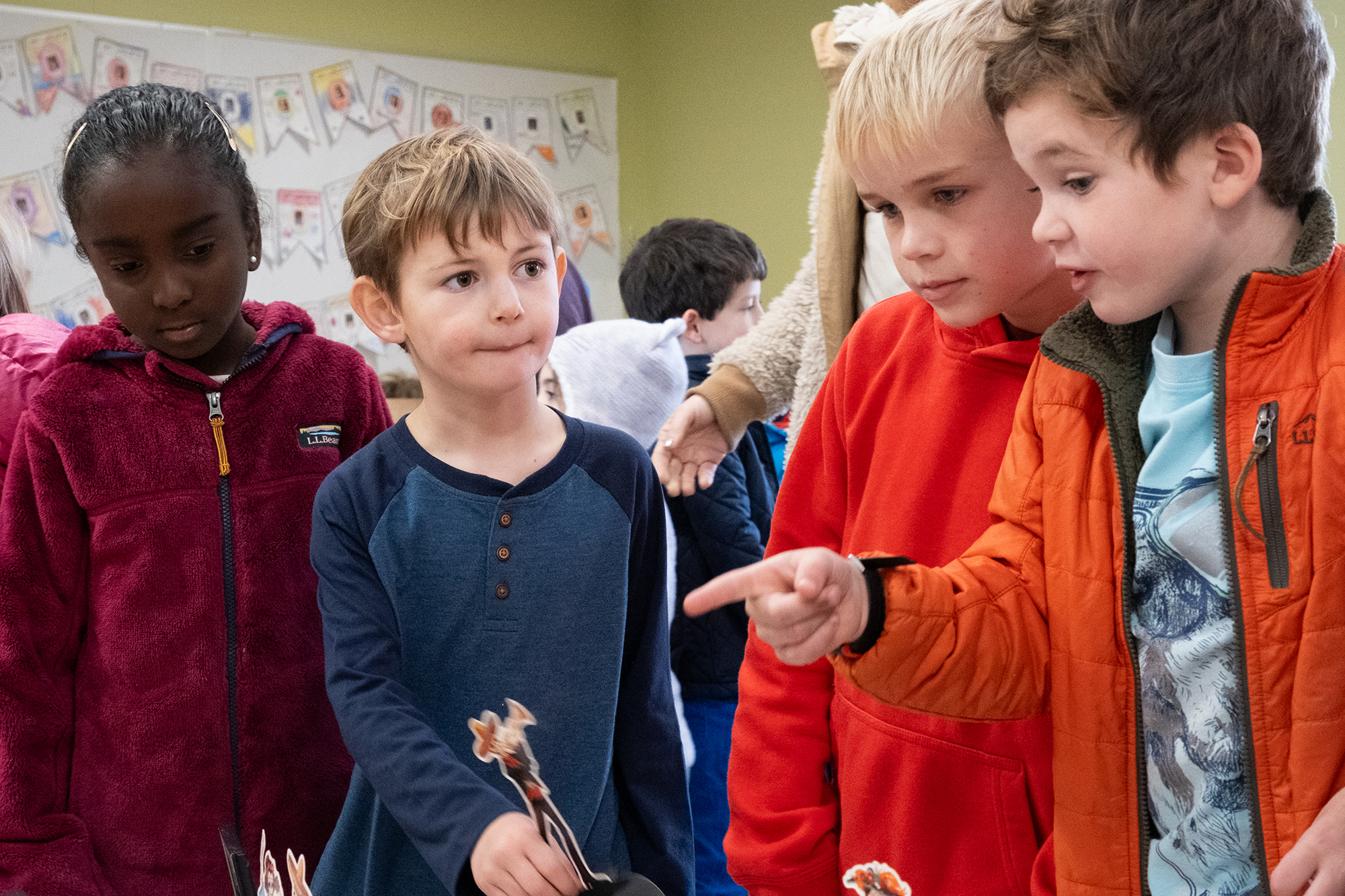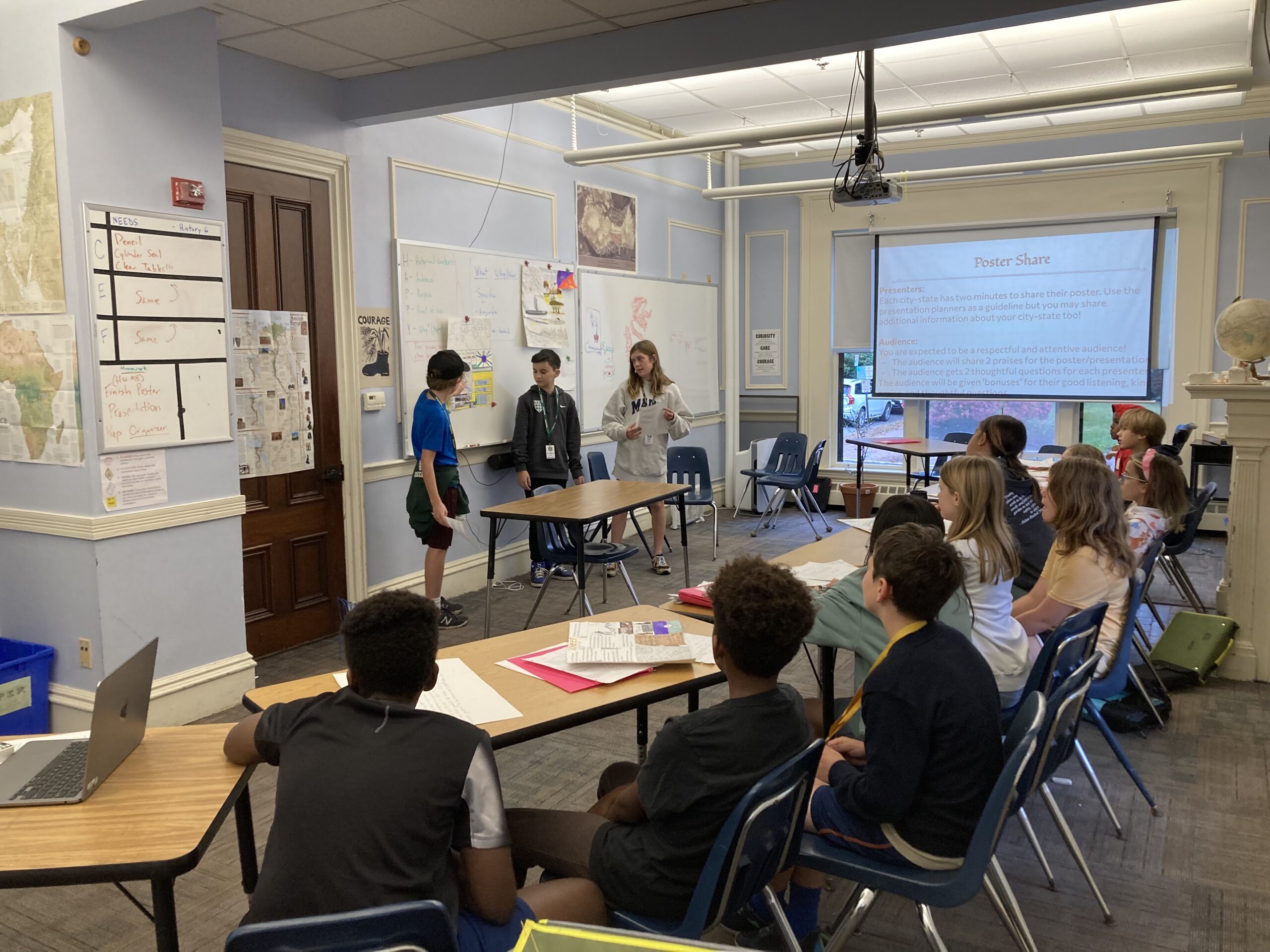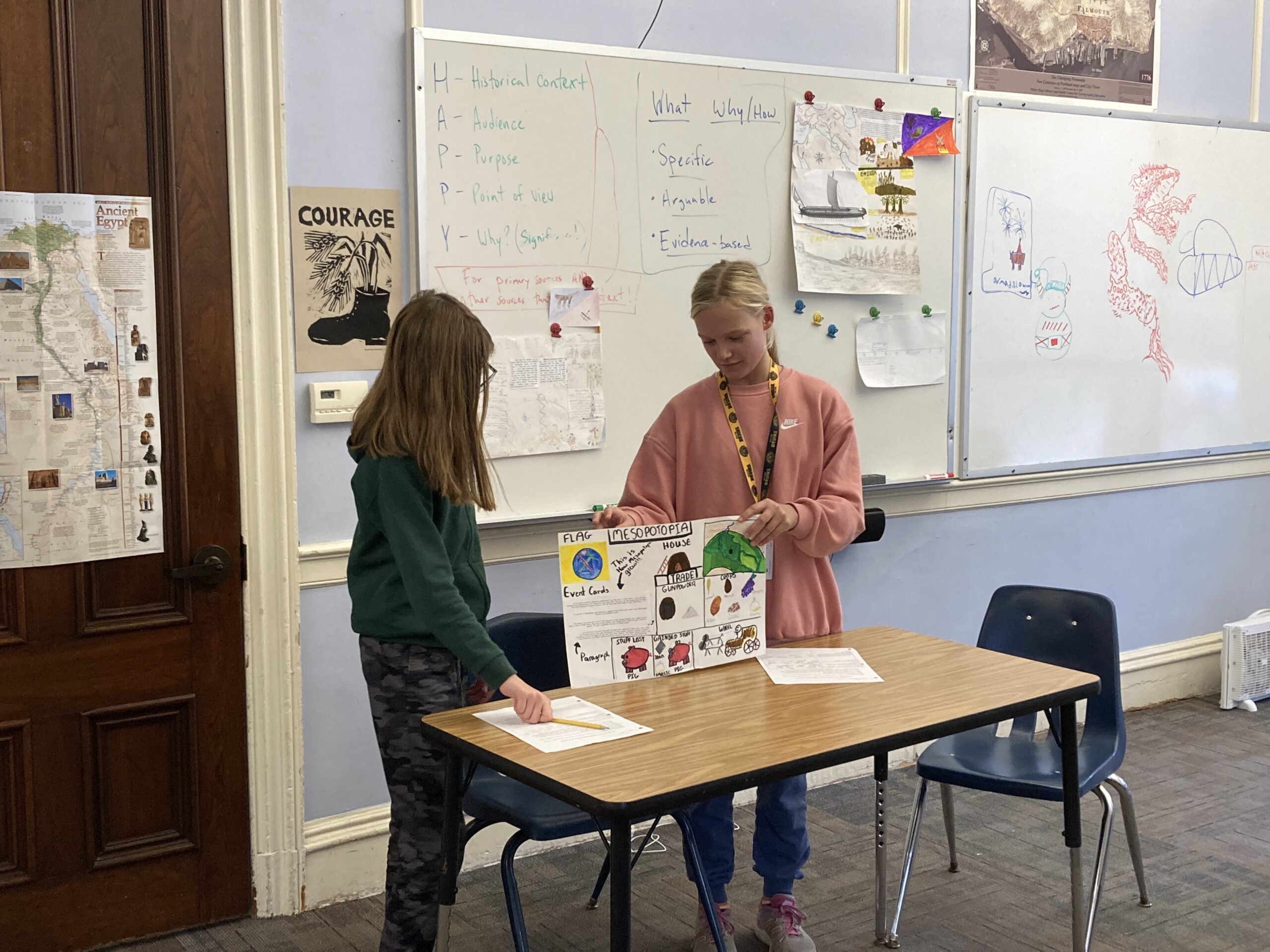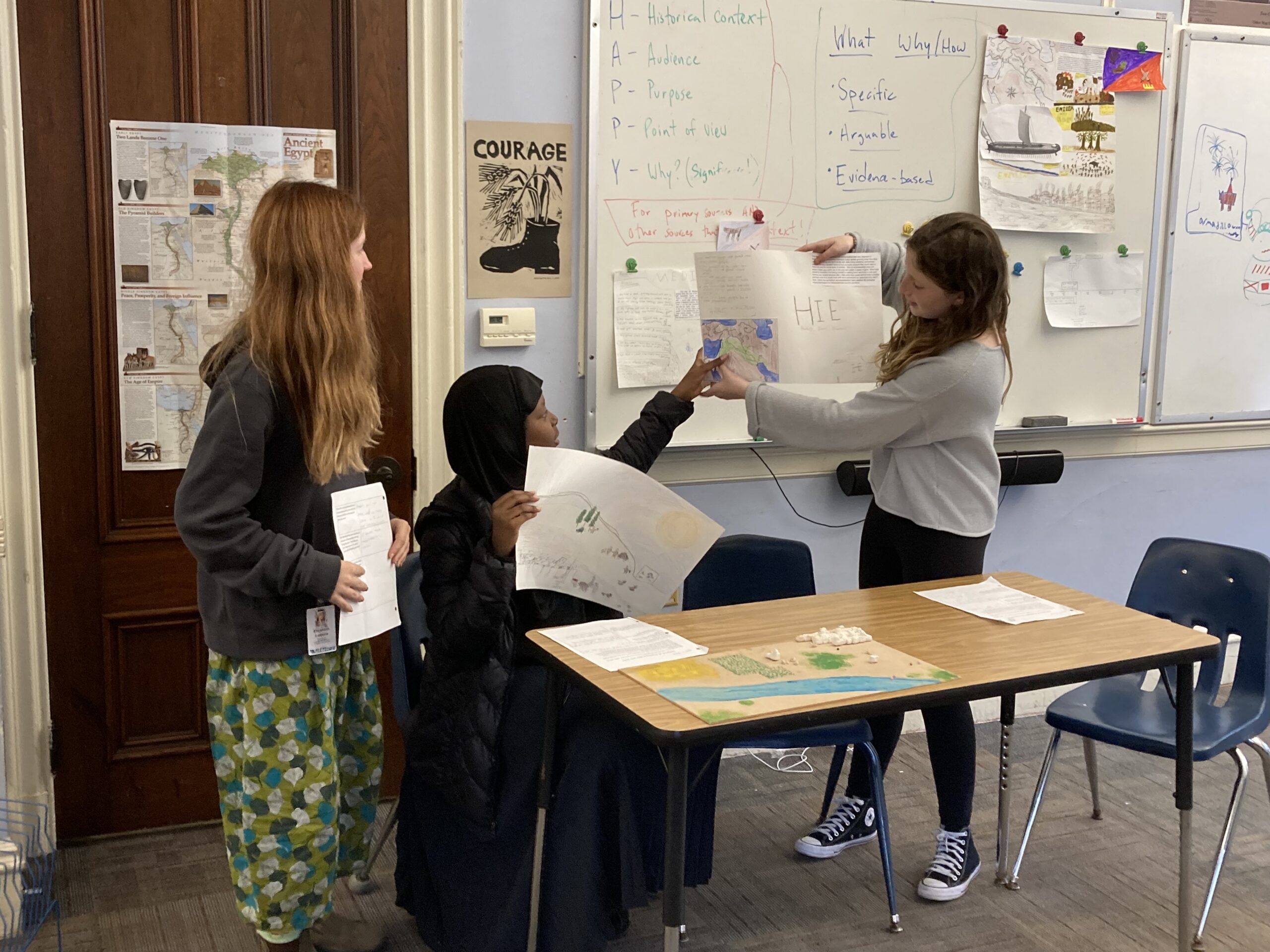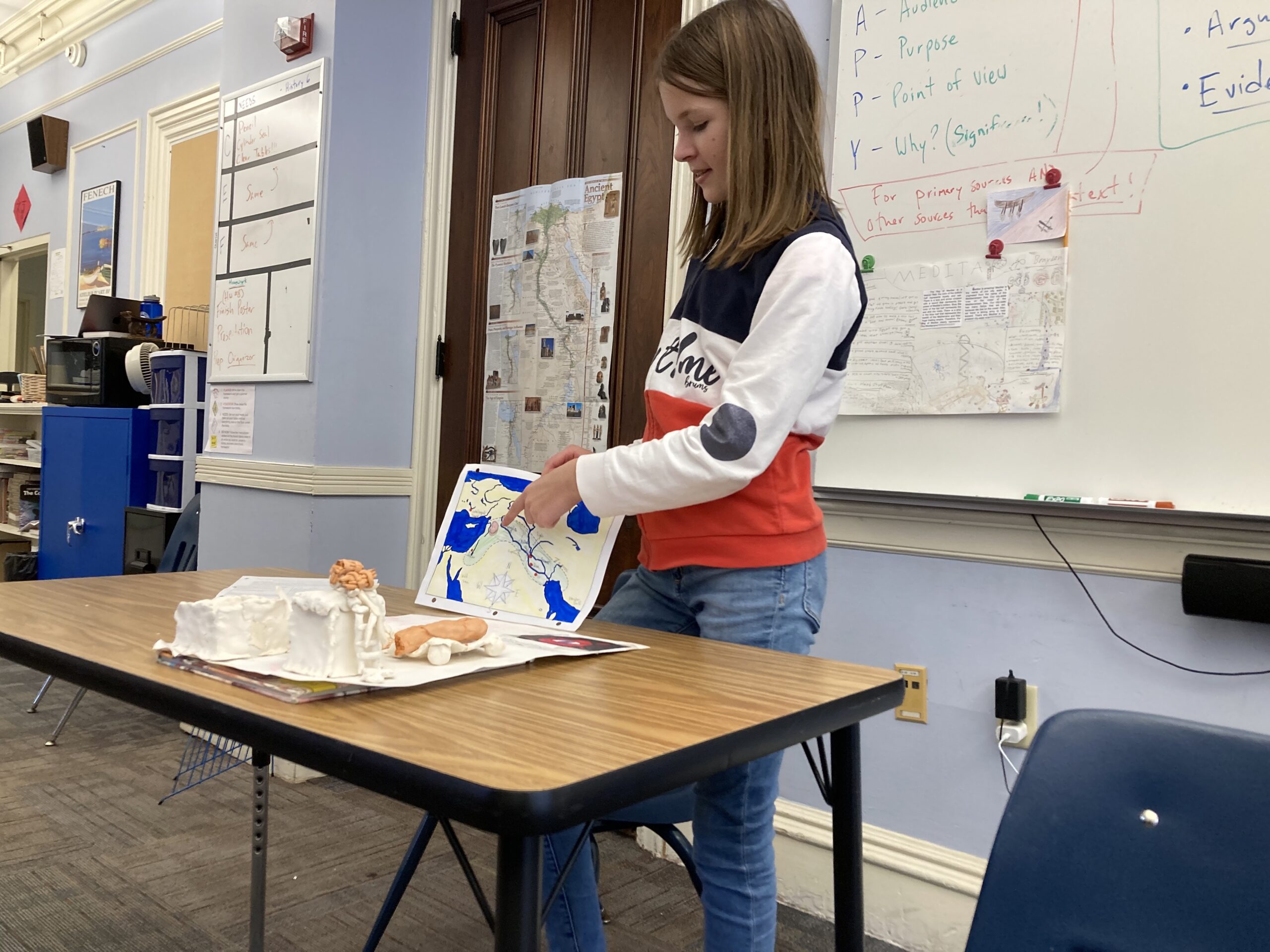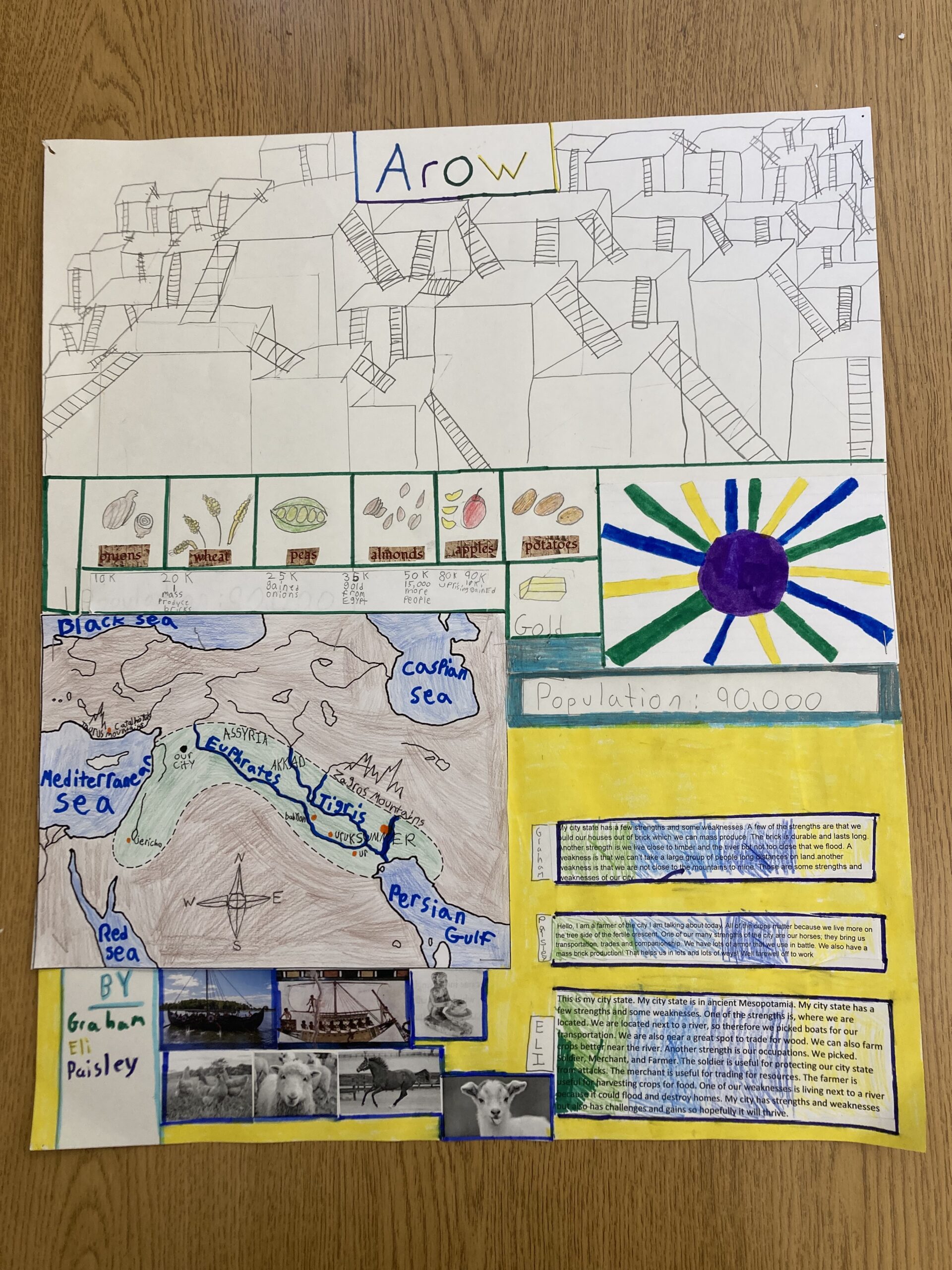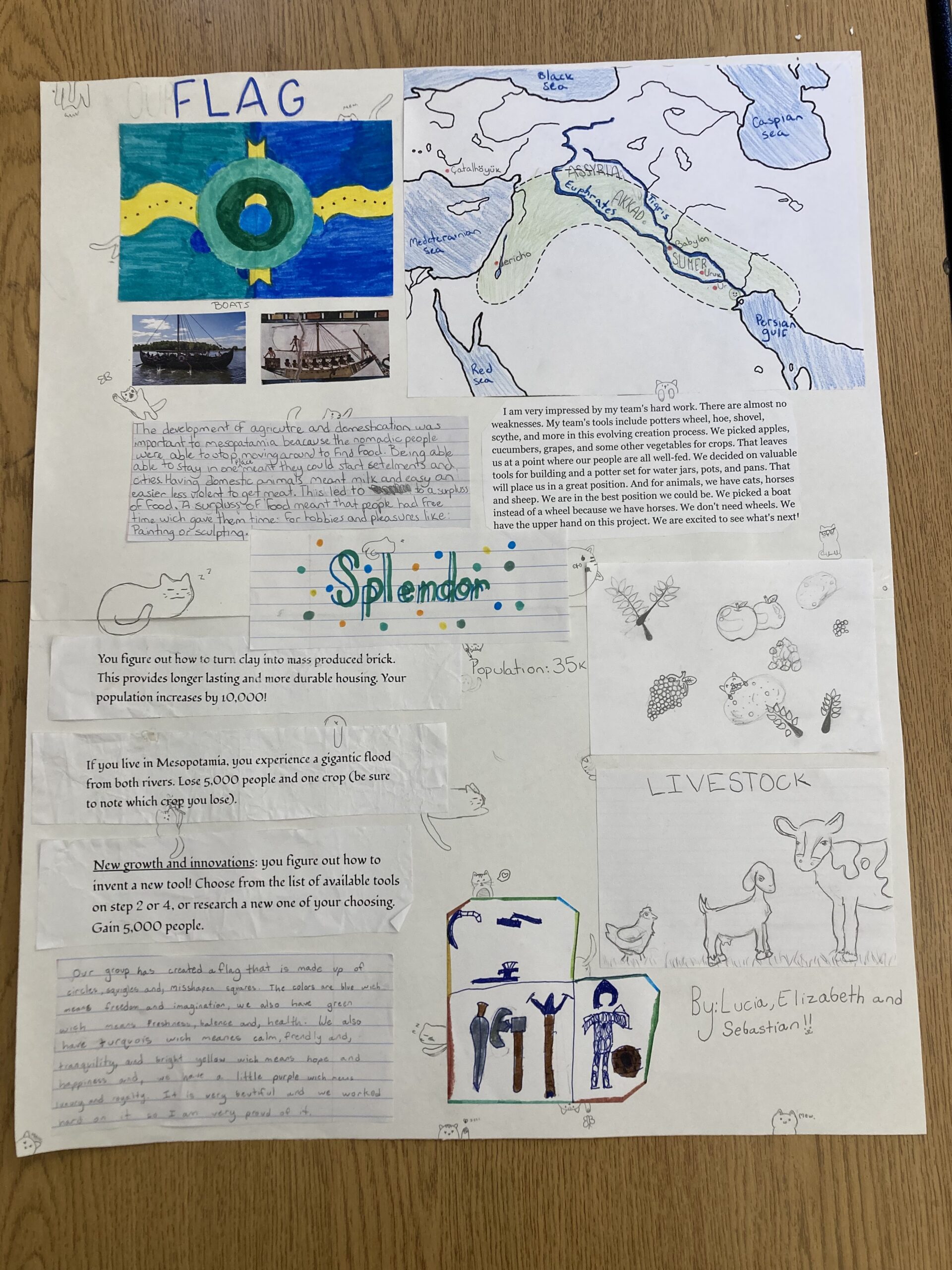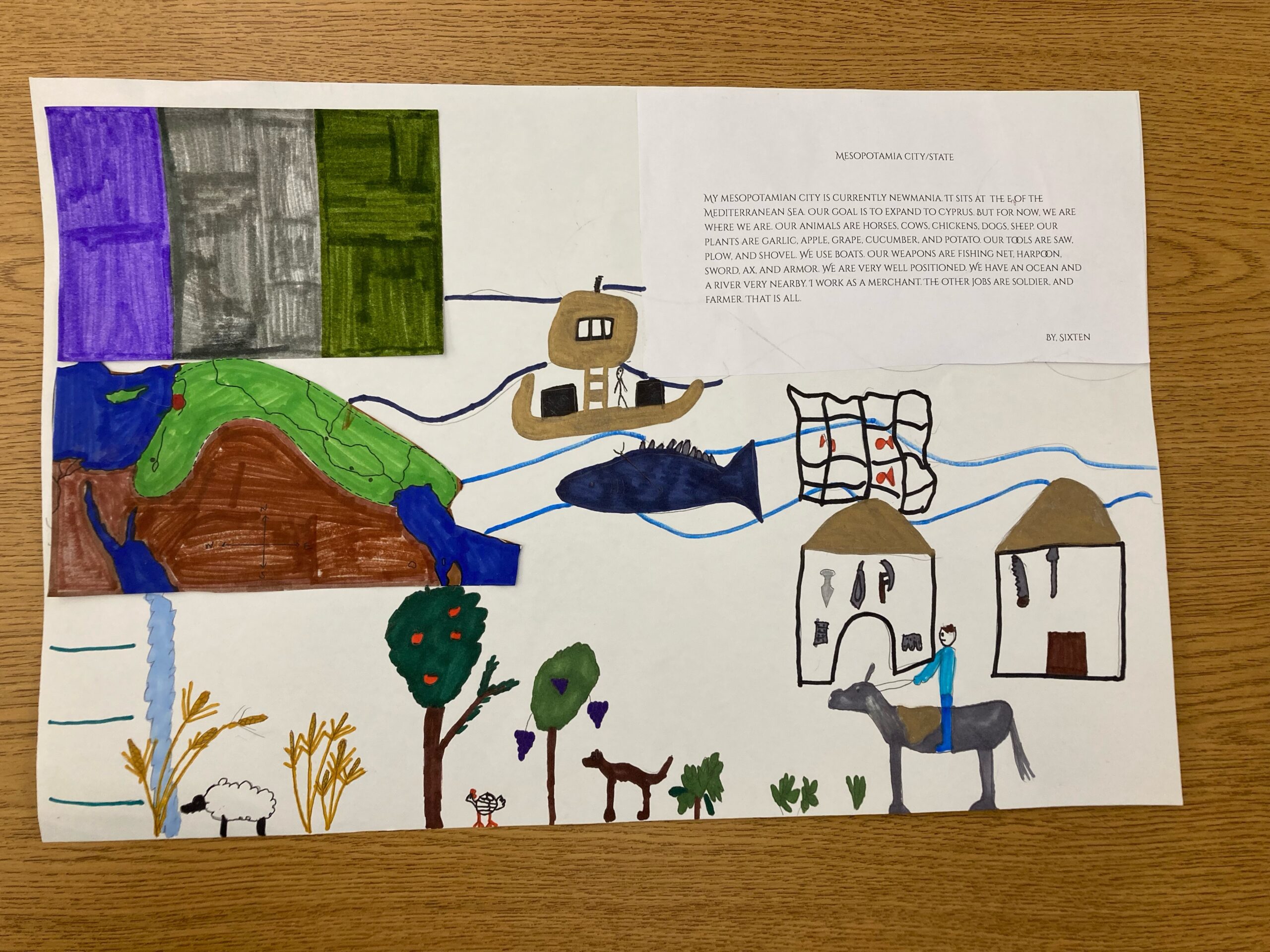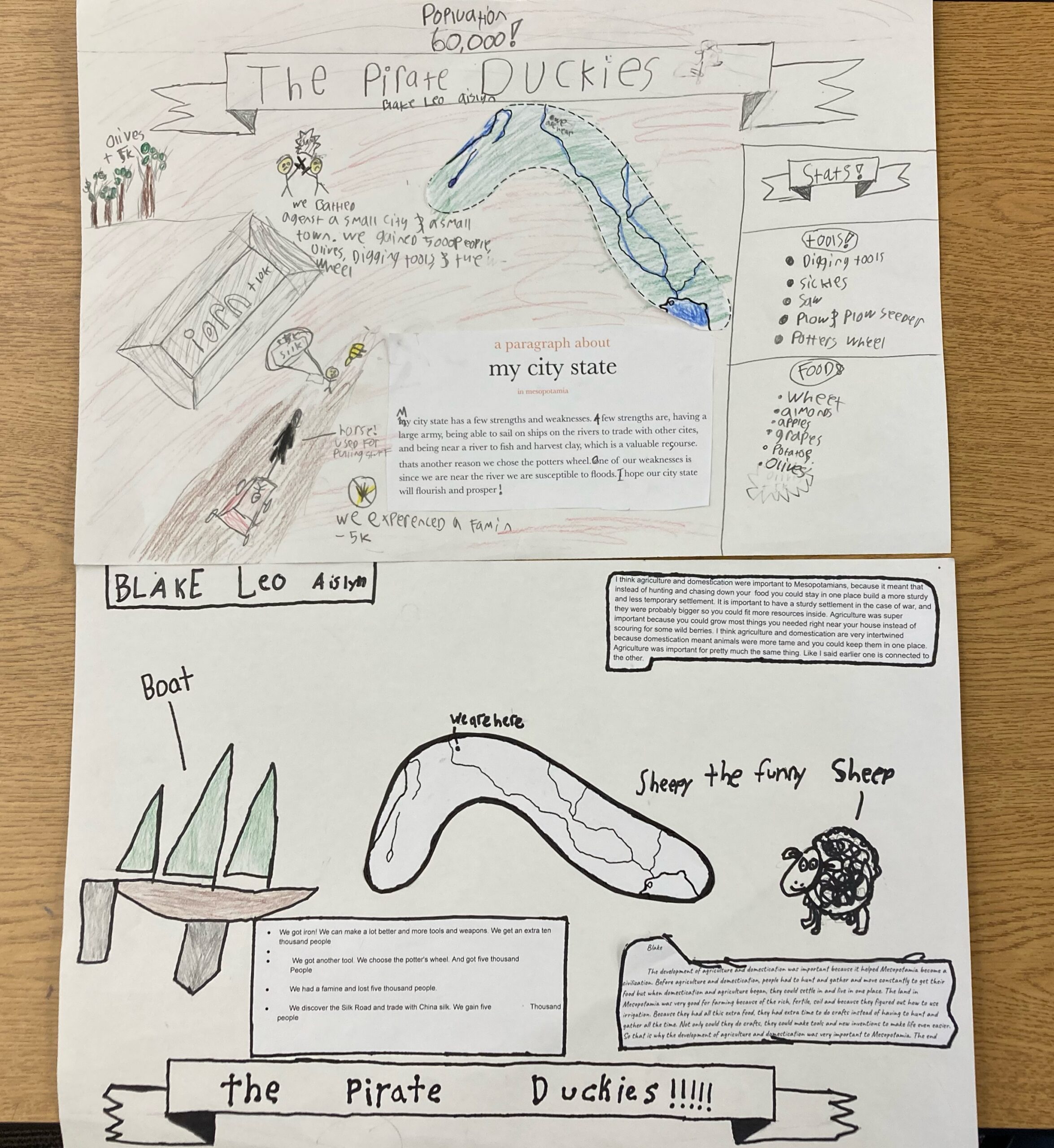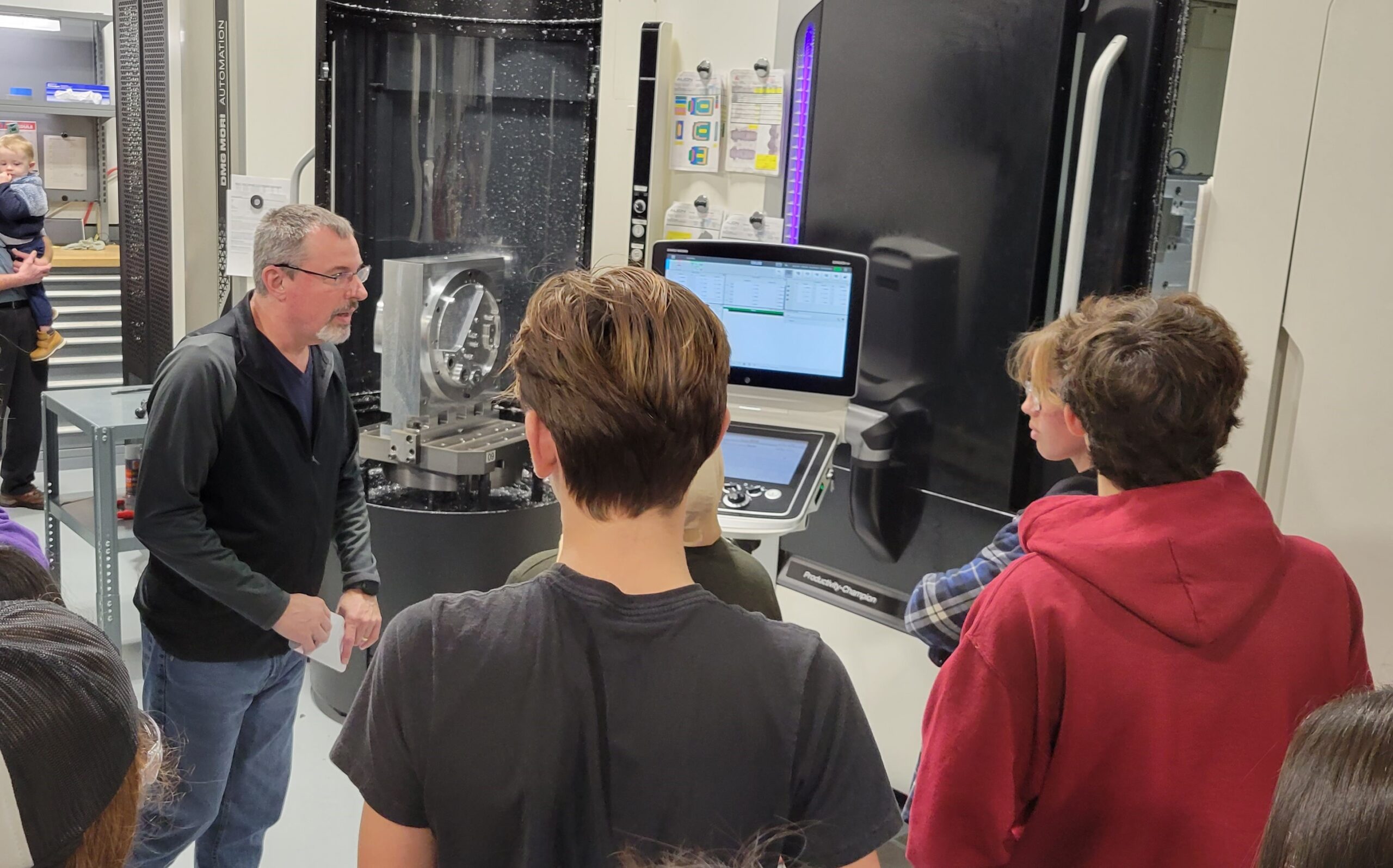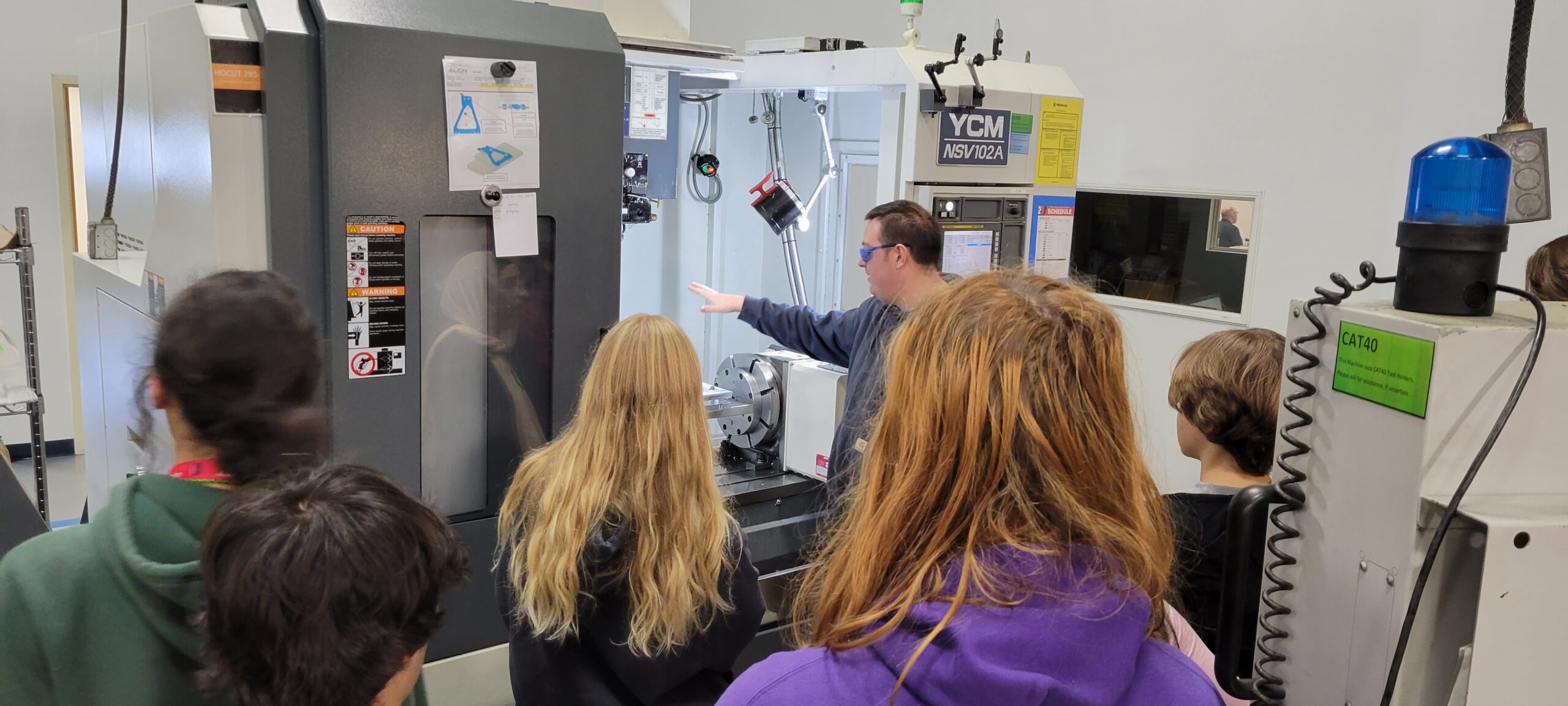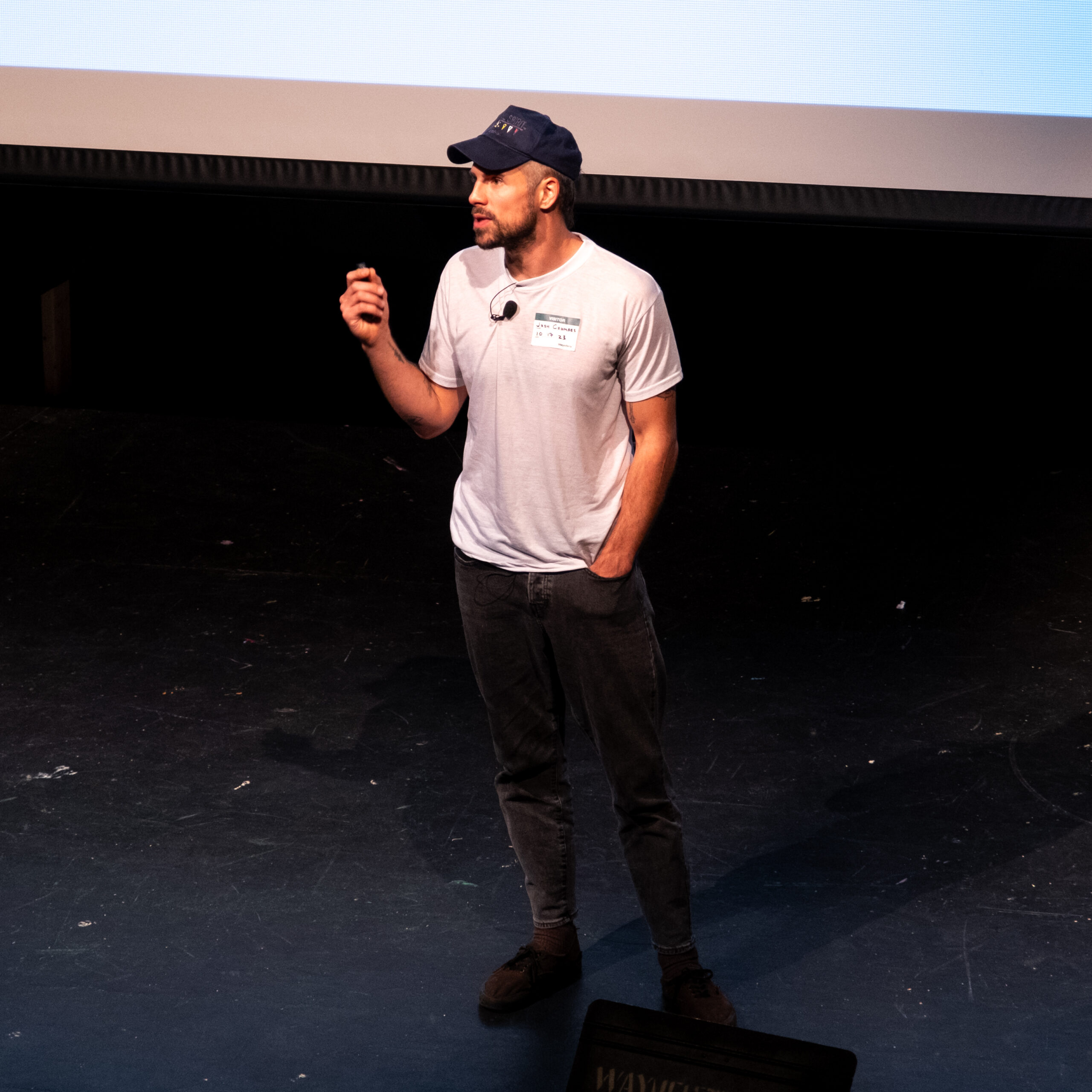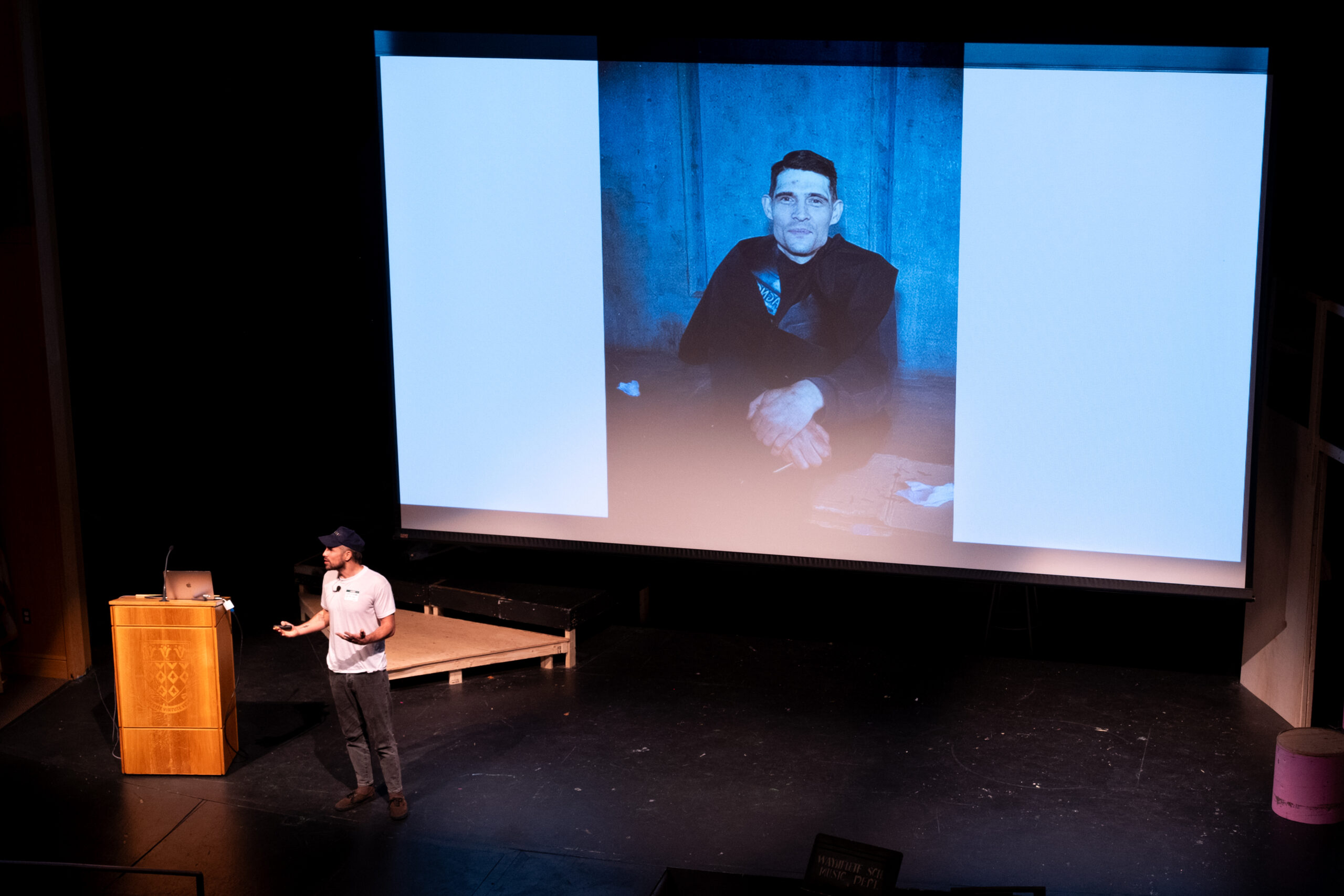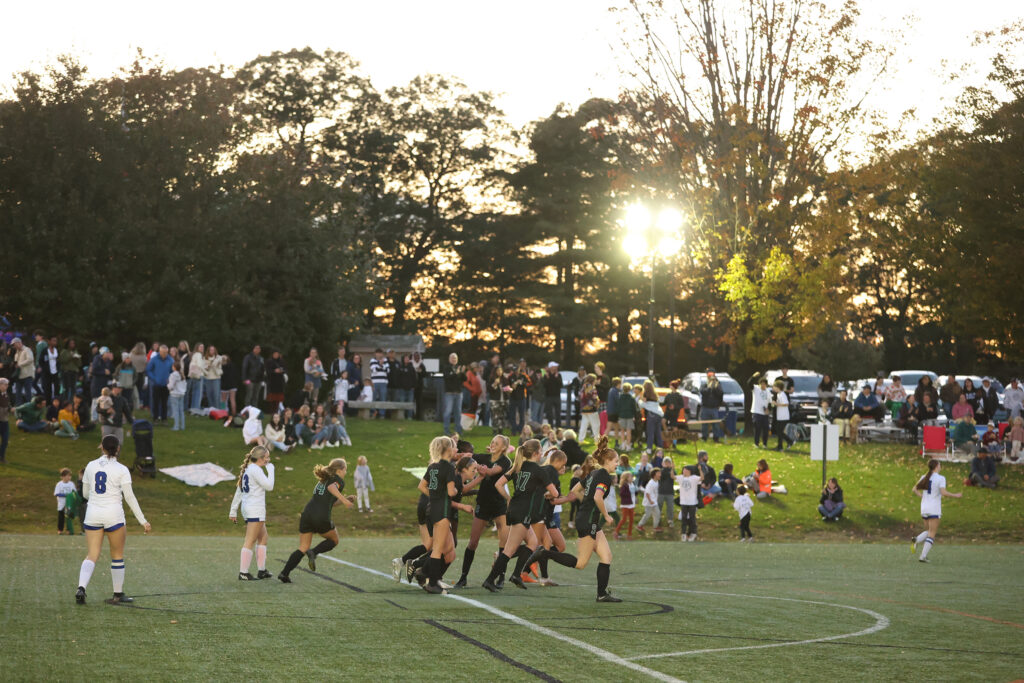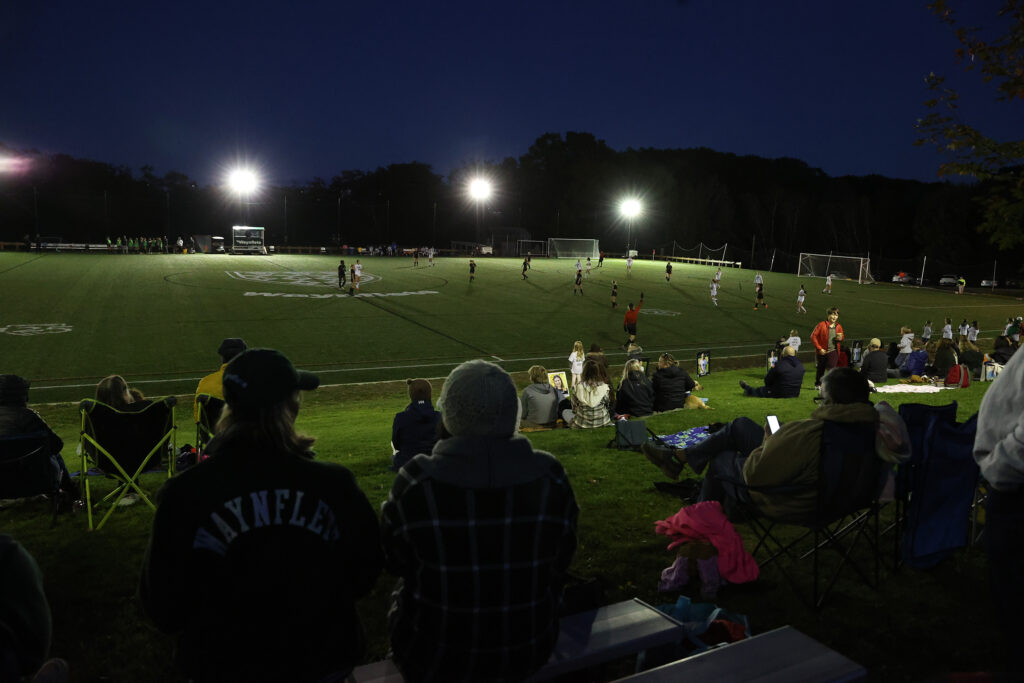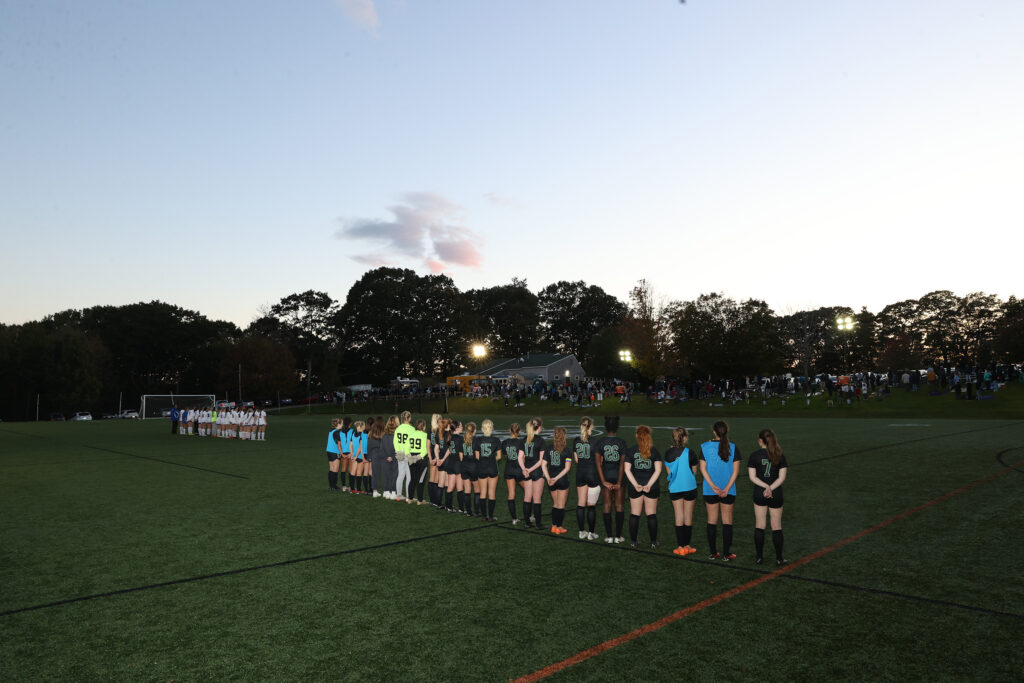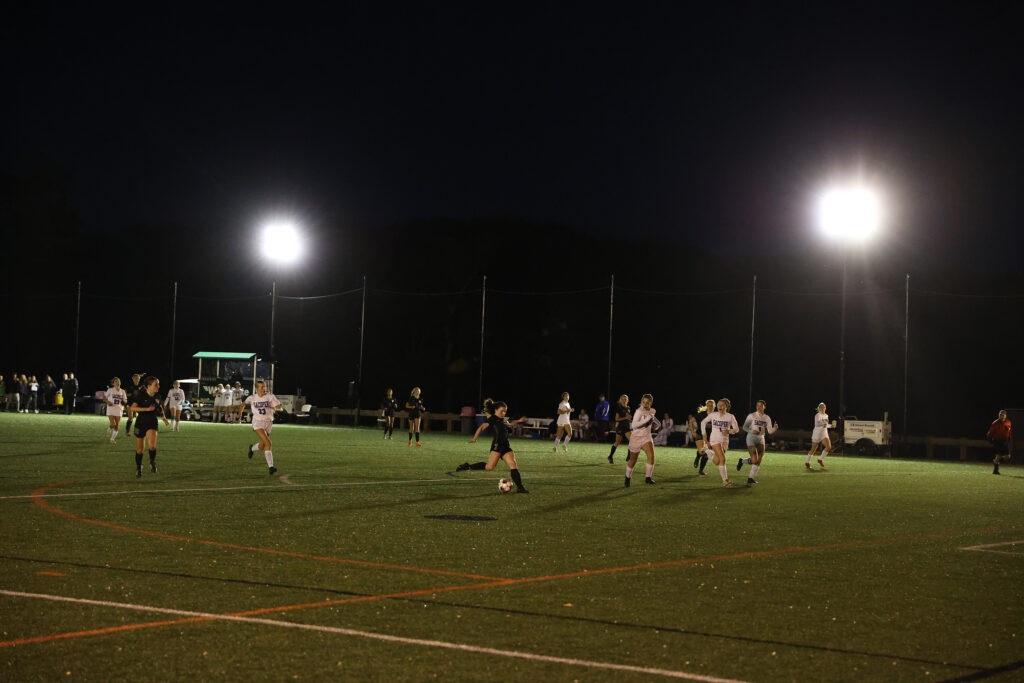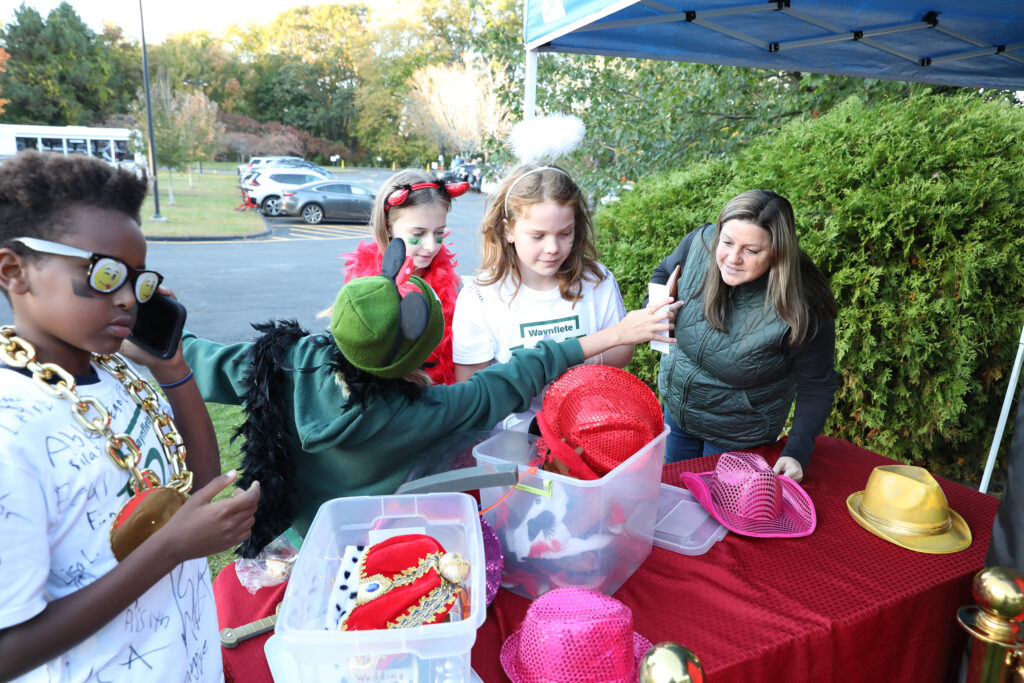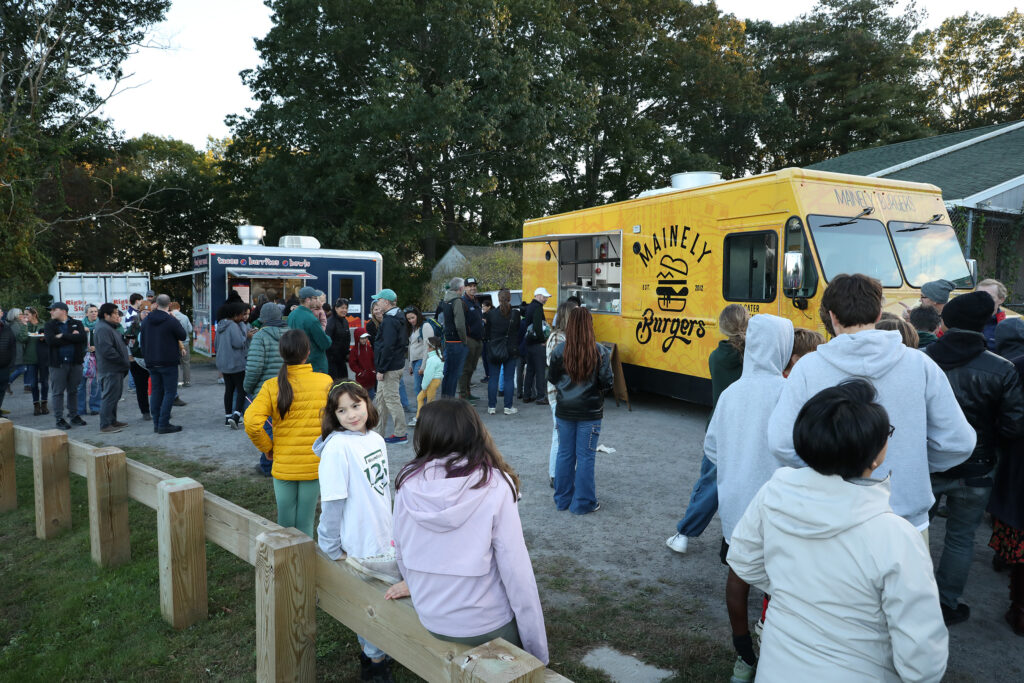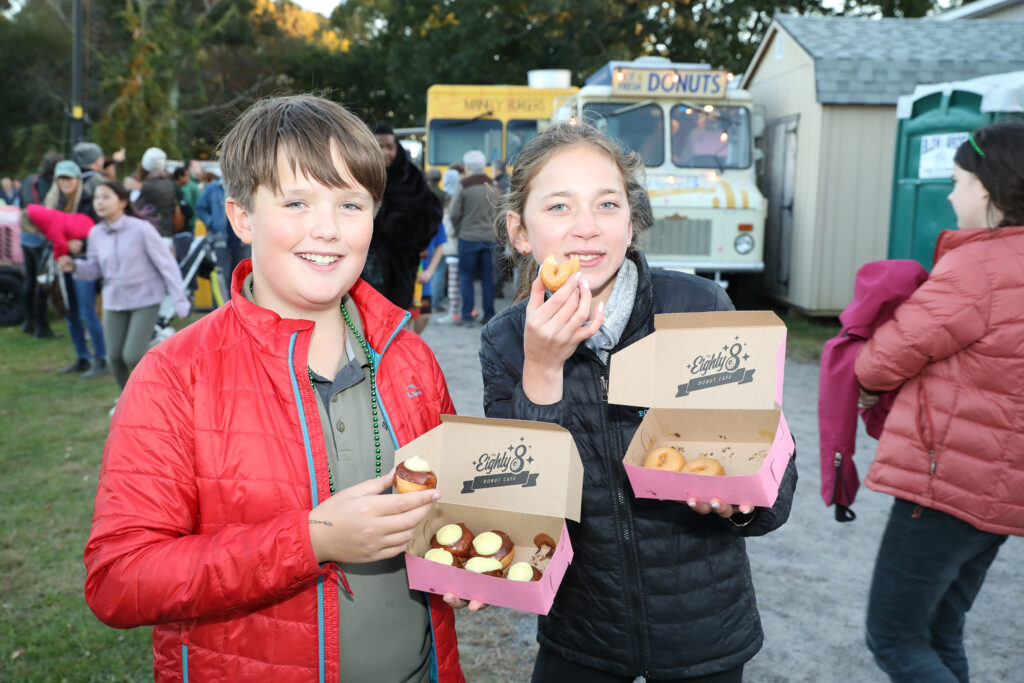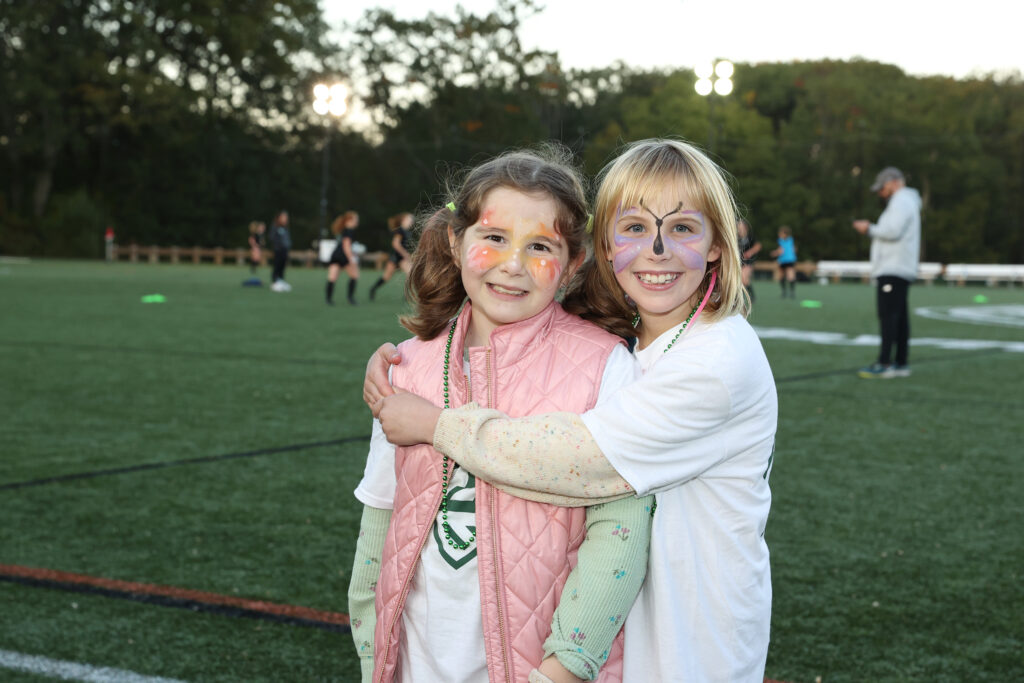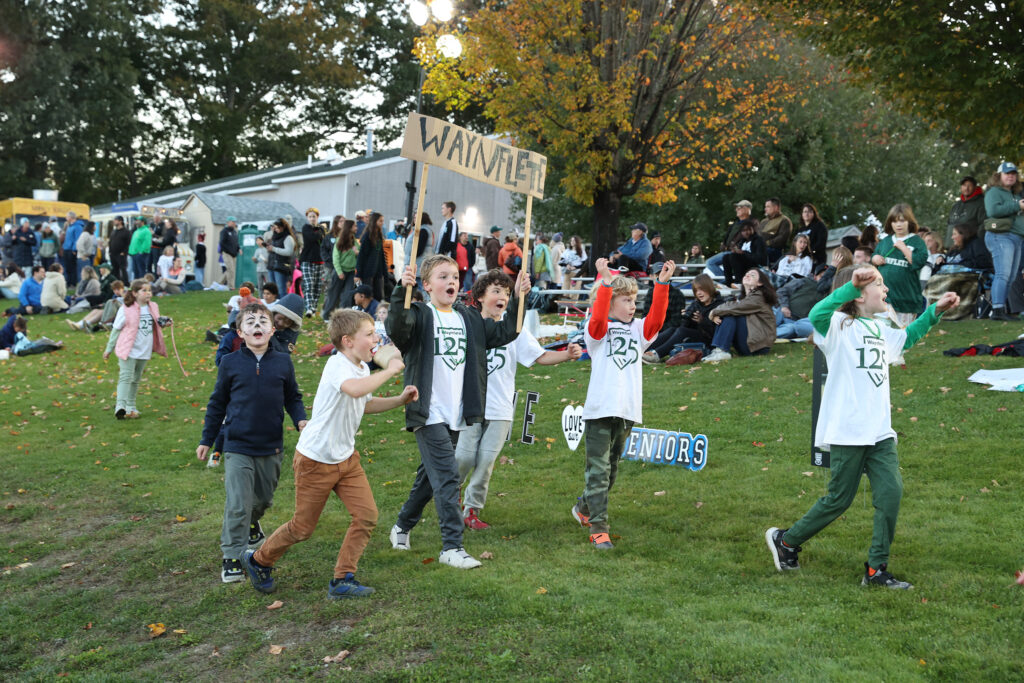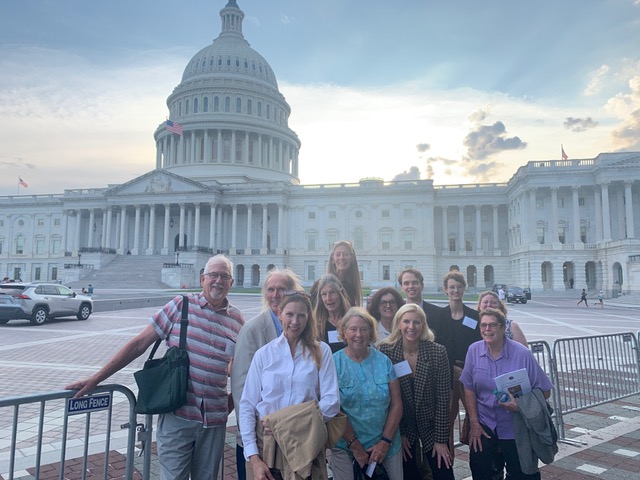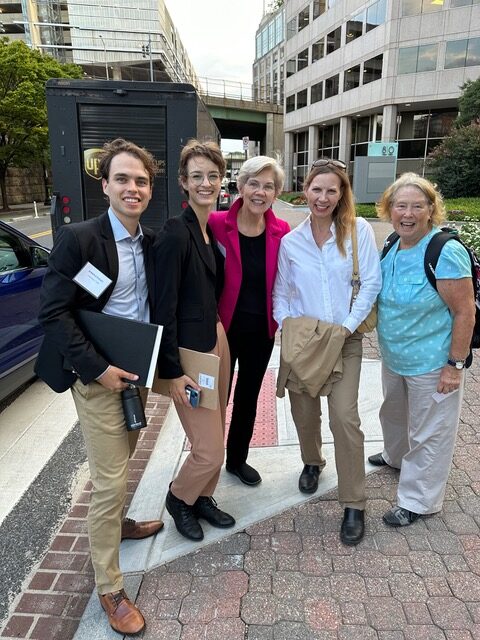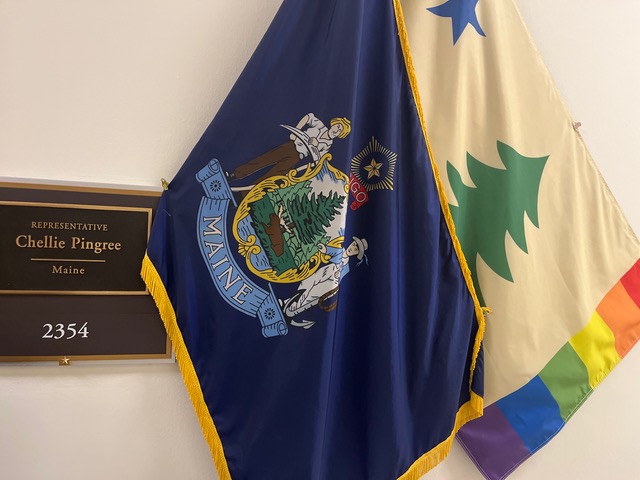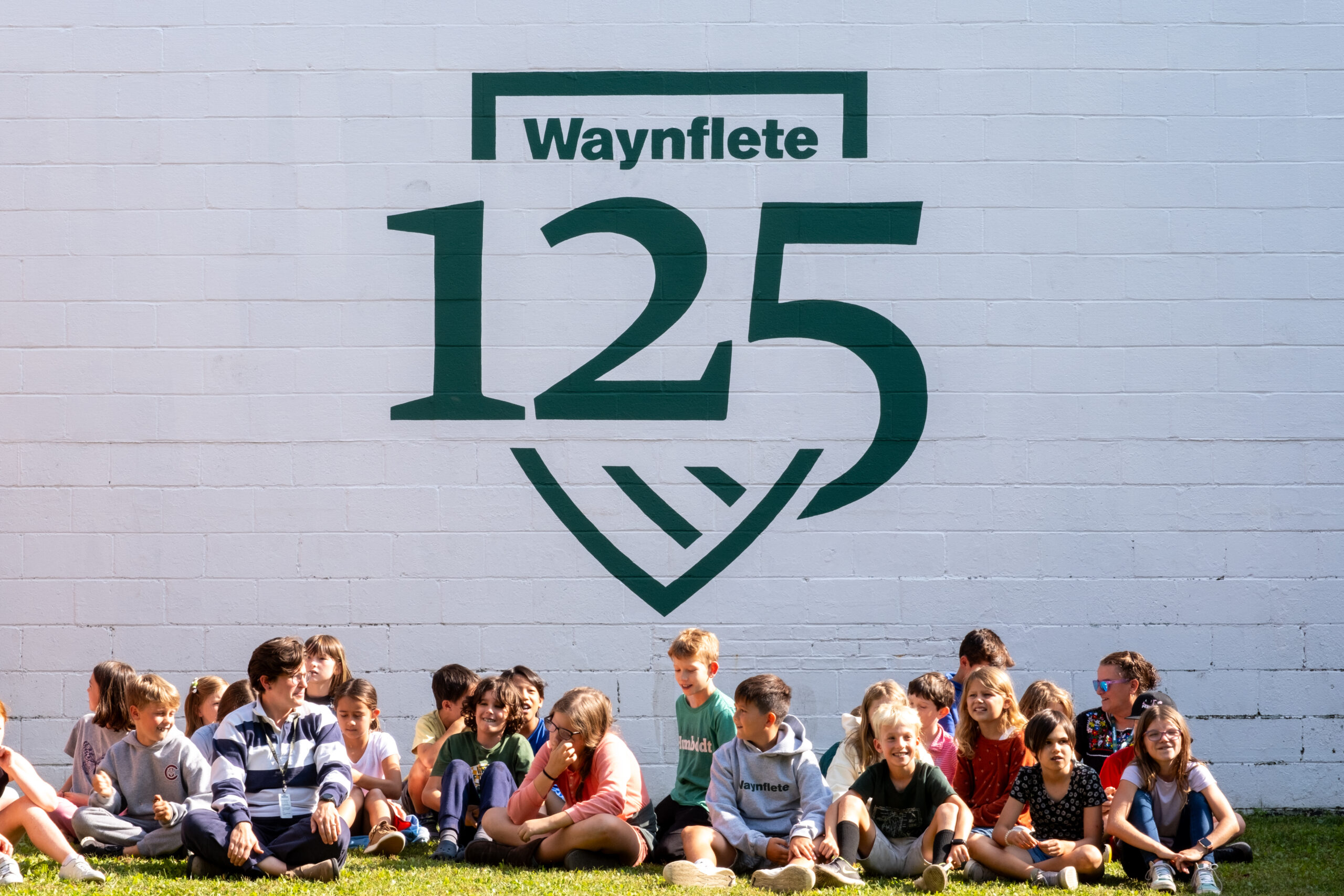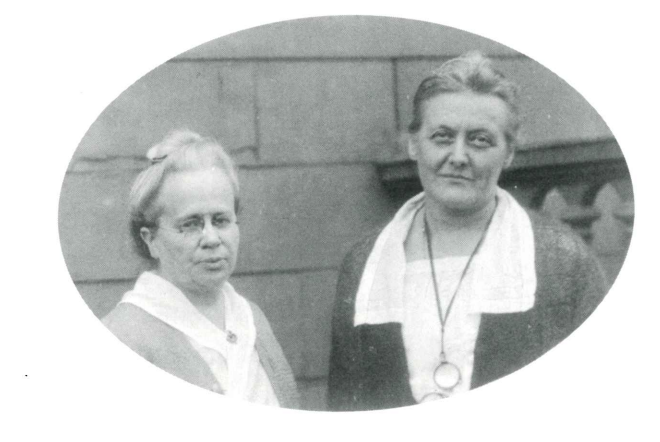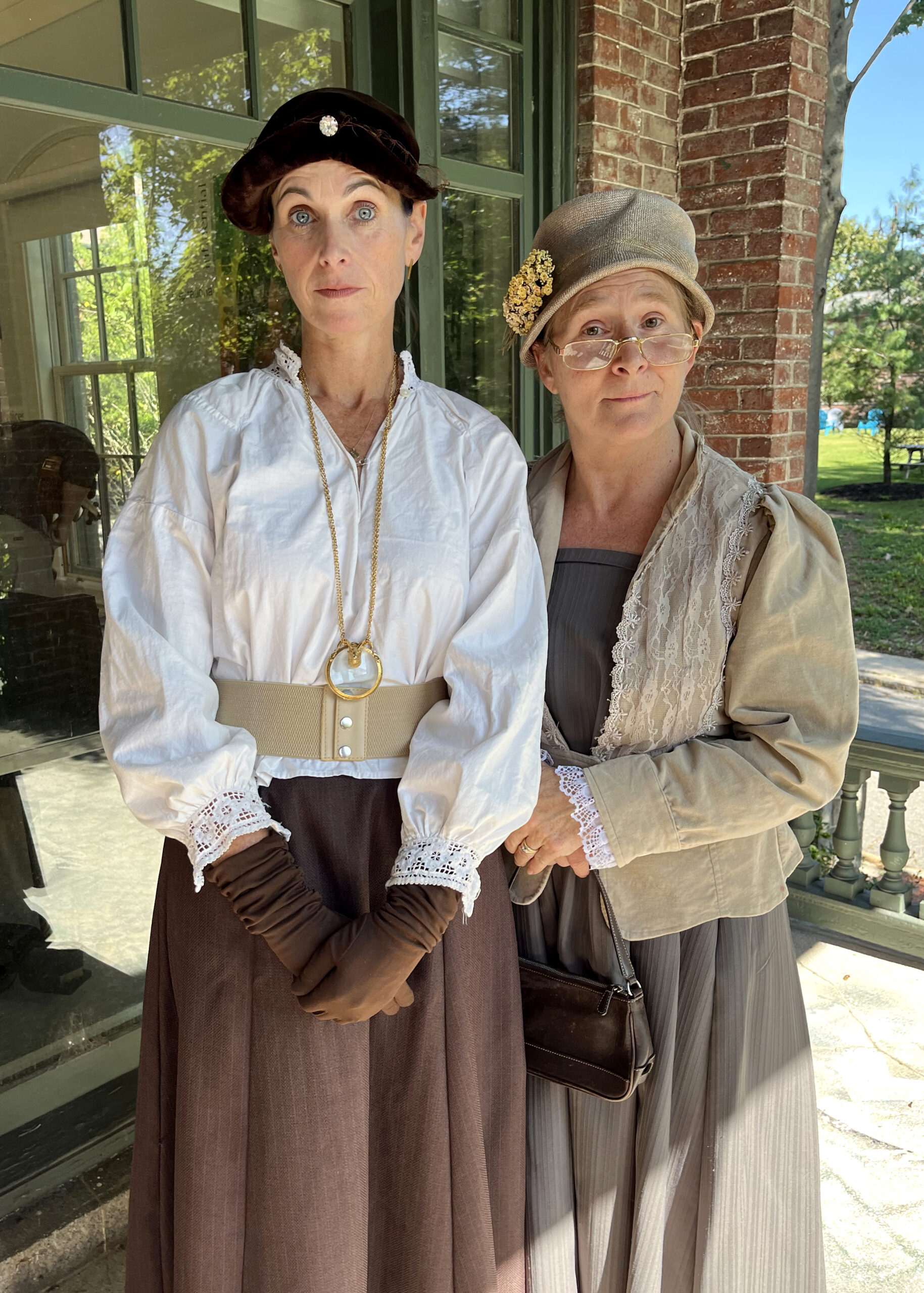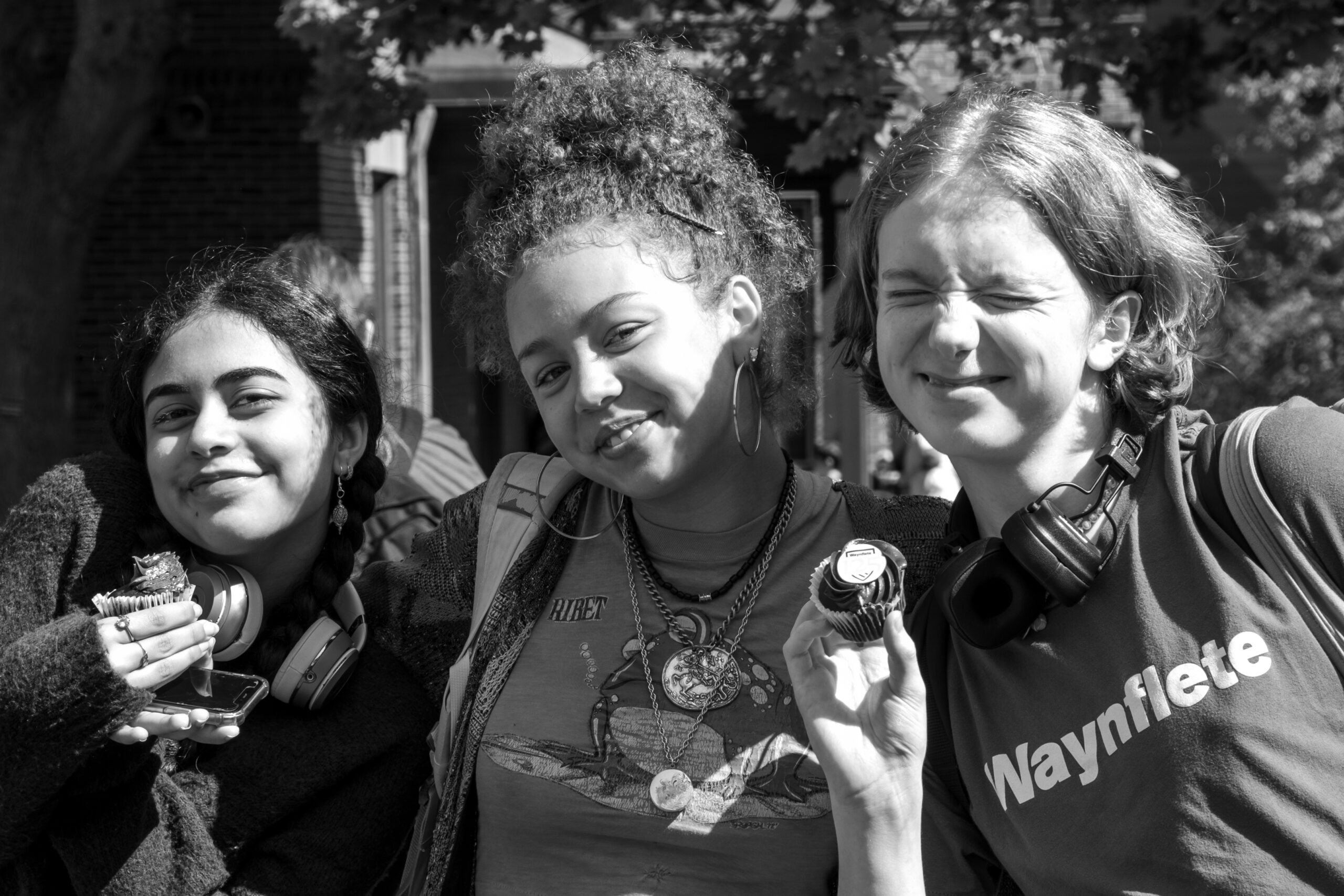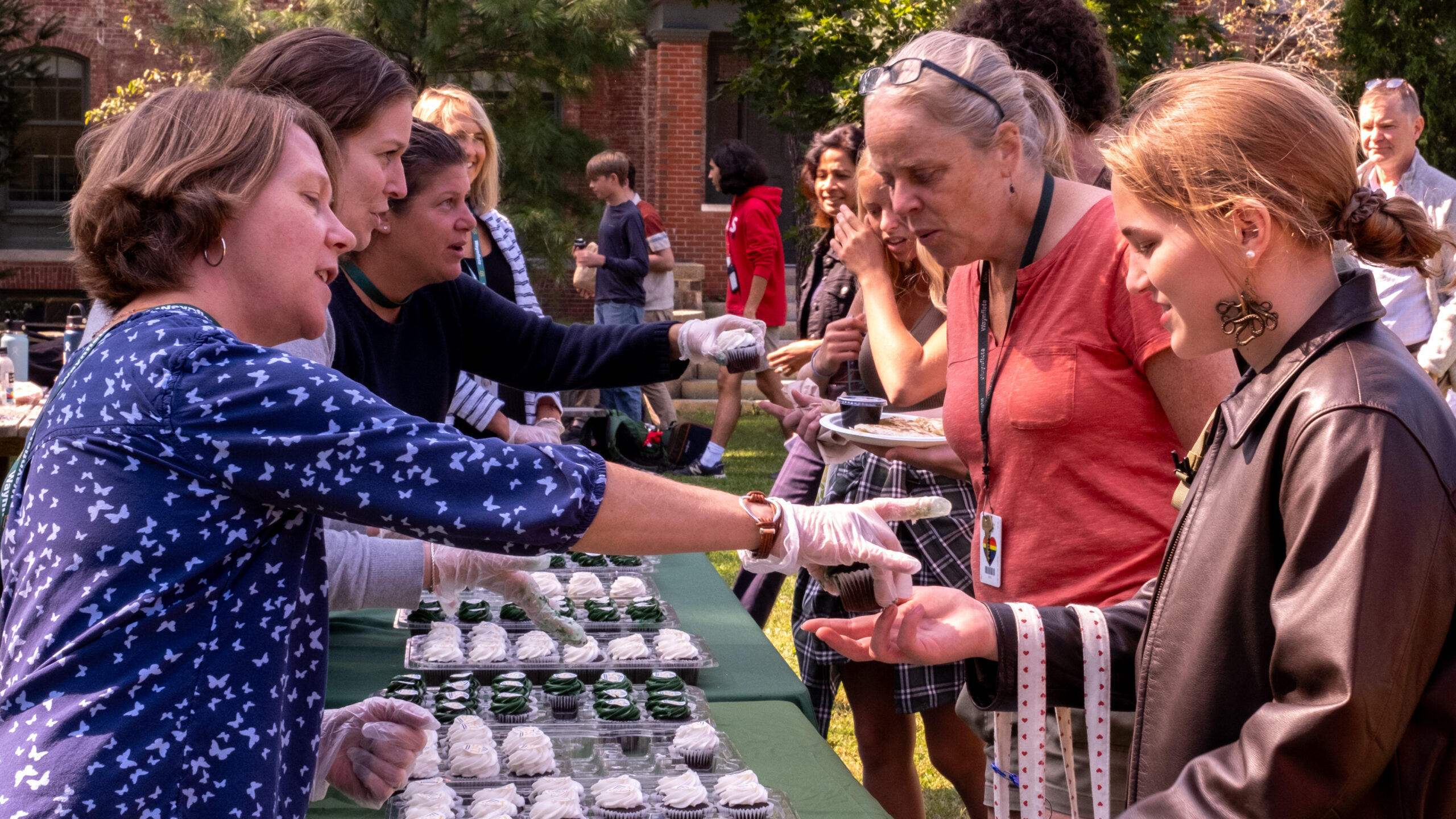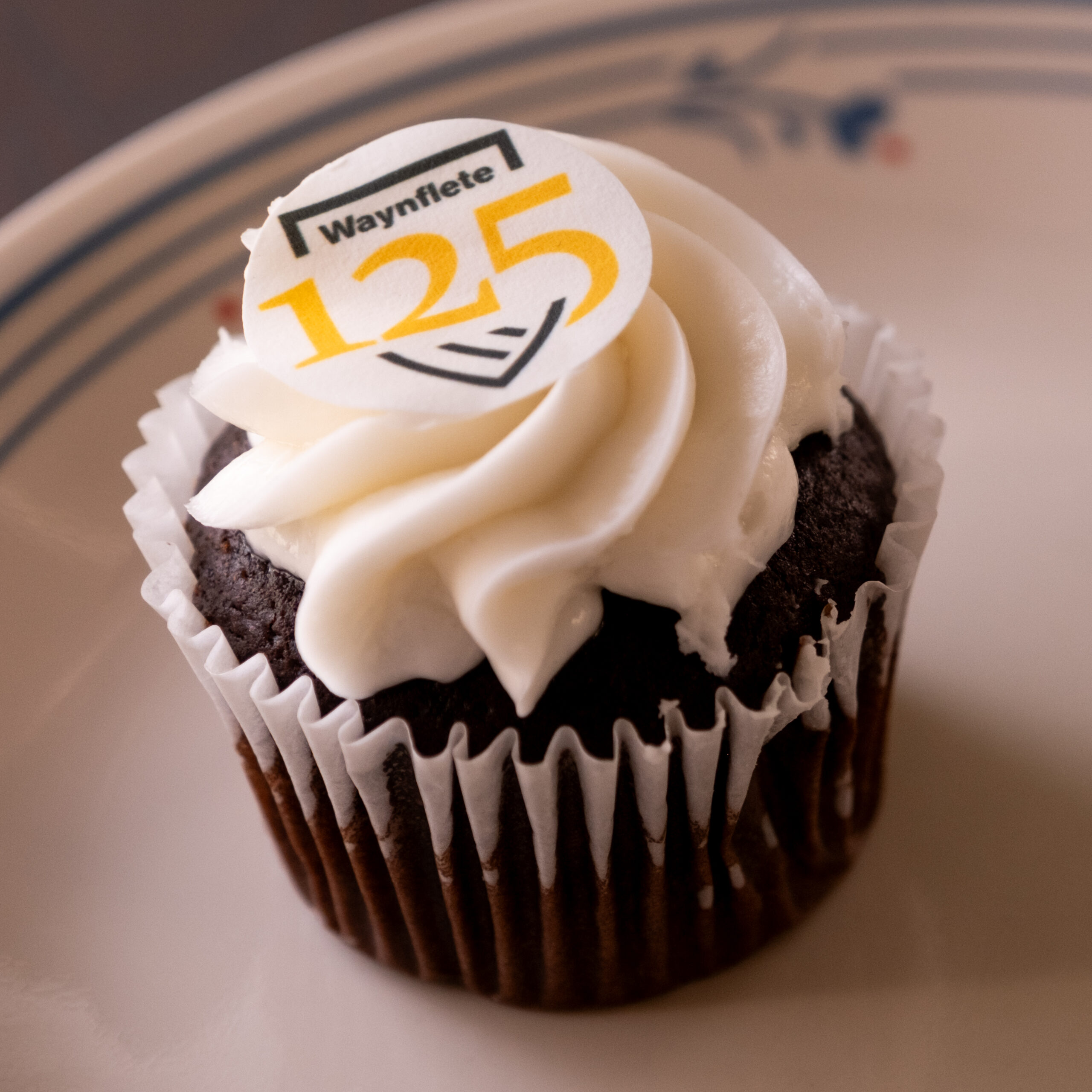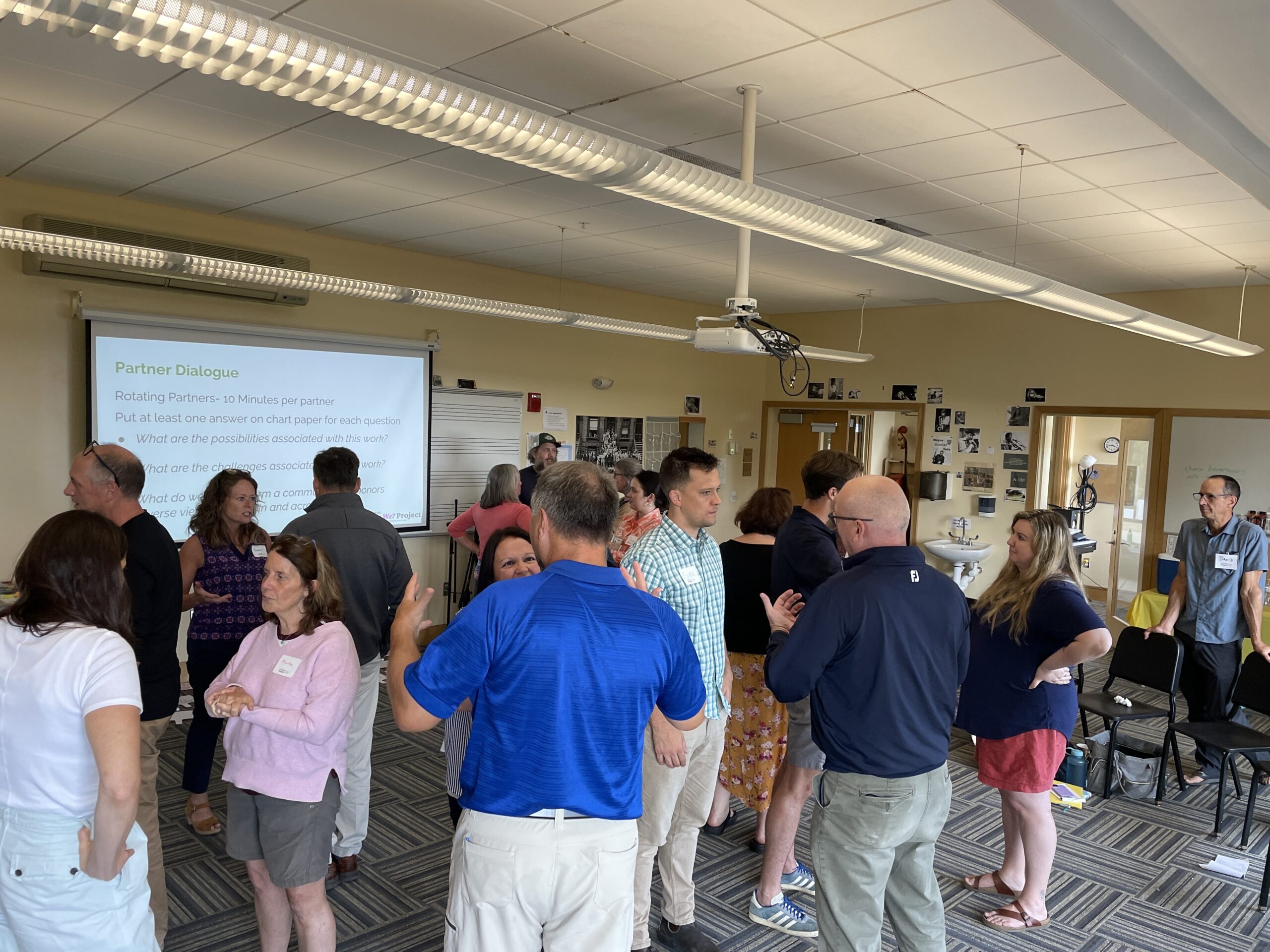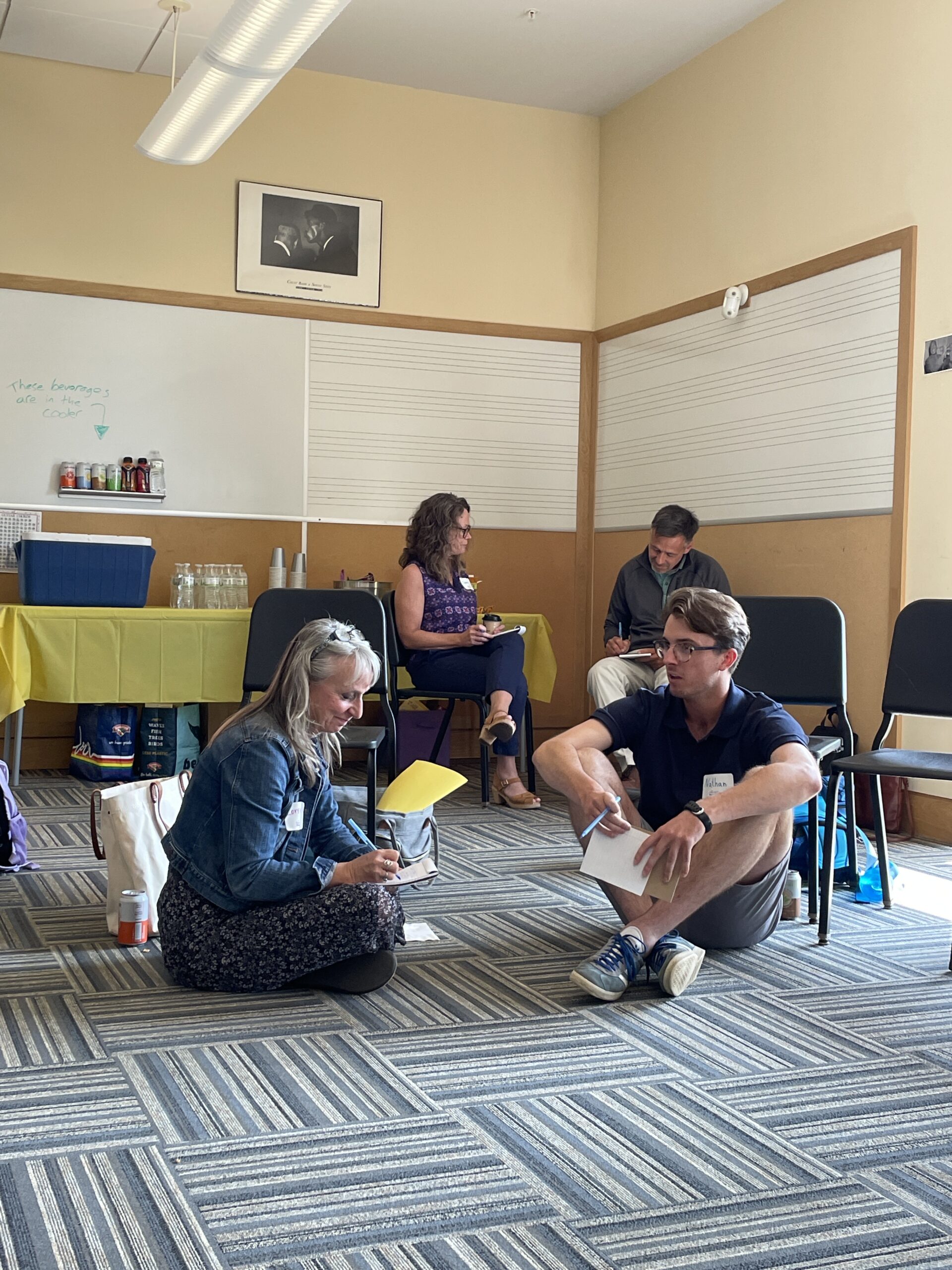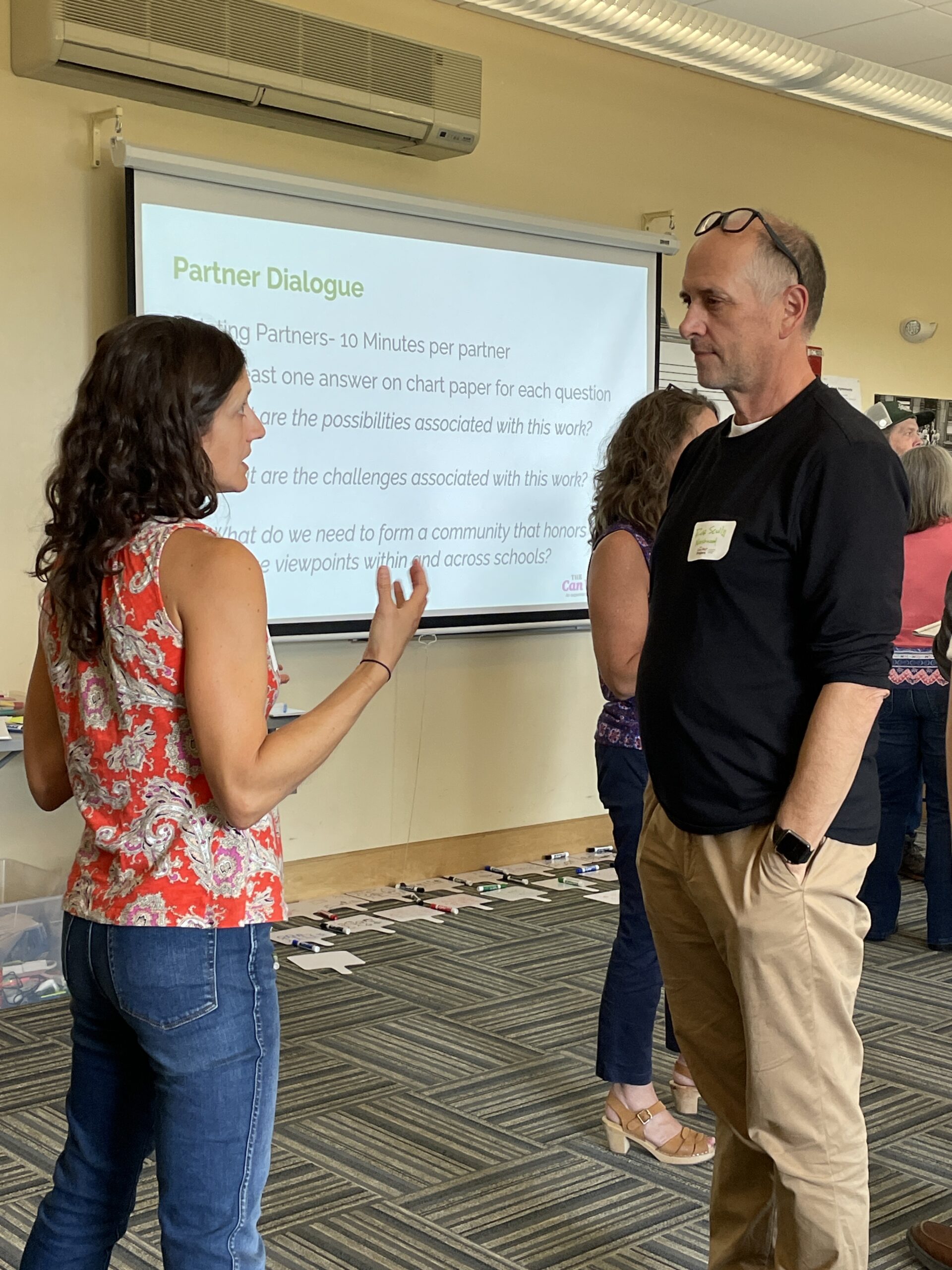Eighth-graders participated in a community service project at Crescent Beach State Park during the first semester. Students collected more than 1,100 pieces of trash and cataloged their findings in Maine’s state scientific report about ocean pollution. In their Visual Arts classes, students folded origami paper cranes to visually represent the total number of collected pieces. The origins of this “Making Data Visible” assignment are found in a visual art movement where artists use data, machine learning, and artificial intelligence to produce aesthetic and visual representations of big data.
Upper School students reflect on NAIS Student Diversity Leadership Conference
Four Upper School students recently joined more than 2,000 students at the NAIS Student Diversity Leadership Conference in St. Louis, Missouri. This conference was a multiracial, multicultural gathering of student leaders from independent high schools across the globe that allowed participants to develop their cross-cultural communication skills, design effective strategies for social justice practice through dialogue and the arts, and learn the foundations of allyship and networking principles.
Our four attendees shared their takeaways from the conference during Upper School assembly yesterday, noting how transformative and motivating the experience was. Tristan Choi ’25 was inspired to create the Asian Students Association at Waynflete. He hopes that the group will provide “an affinity space to discuss Asian experiences and changes that need to happen, but also the beauty of our culture.”
Hands-on history: Middle School students explore the past in archaeology unit
Arthur Anderson, Ph.D., an associate teaching professor of archaeology from the University of New England, recently visited Waynflete to help grade 6 history students kick off their mock archaeological dig. Student groups were given a bin of soil (or layers of sand and dirt) filled with artifacts from a specific time and place. Using the layers (stratigraphy) and other clues, students determined the era and origin of their artifacts. They used their collected data and recorded observations to present their findings. The goal of this unit was to show students how artifacts help tell a story and can give us valuable insight into how people lived in the past.
Celebrating literary freedom: Lower School students engage in Banned Books Week
During Banned Books Week, students in grades 4–5 learned about some of the most challenged, age-appropriate books in the United States. They created posters that defended those books and celebrated their freedom to read!
Middle School students bridge history and advocacy in unit exploring Maine’s industries
Phil Coupe from Revision Energy recently visited with seventh graders to teach them about different industries in Maine in preparation for their upcoming history unit, Maine Industry Past and Present (this unit will build off the seventh-grade theme “Exploring Home”). As students research Maine industries such as lumber, shipbuilding, potatoes, blueberries, fishing/lobster, and skiing, they will look for relationships between the state’s geography and how it influences what people do for work, play, food, etc. Once students have completed their research, they will write and illustrate a children’s book based on their chosen industry, then send it to a Maine representative with a letter sharing what that individual can do to assist the industry.
Perspective Project kicks off the year by hosting Margo Walsh ’82
The Perspective Project is an Upper School student-led initiative that uses the power of conversation to learn from—and celebrate—diverse perspectives and experiences. The Project recently held their first event of the year featuring Margo Walsh ’82, the founder of MaineWorks and the United Recovery Fund. Margo discussed her work helping new Americans, people in recovery from substance use disorder, and previously incarcerated individuals who face barriers to re-entering the workforce. MaineWorks helps people access transportation to job sites; rental assistance for sober living; workforce outerwear and tools; dental, vision, and mental healthcare; and assistance developing practical living skills like financial literacy. Margo shared one essential piece of advice: “If your voice shakes, you have to say it.” Stay tuned for more events from the Perspective Project!
Empowering Middle School voices: the return of student council
Middle School student council has returned! Spearheaded by Middle School Dean of Students John McDevitt, student council is an opportunity for Middle School students to share their insights and develop essential leadership skills. 13 representatives—one from each homeroom—were elected by their peers to serve. The student council has plans to coordinate Middle School service learning opportunities and to take on some responsibility for community-building activities such as assemblies and socials.
Dr. Nnedi Okorafor brings stories to life at Waynflete
Students, faculty, and community members were inspired, entertained, and moved by Monday’s evening interview with award-winning author Dr. Nnedi Okorafor. Dr. Okorafor spoke of her experience as a daughter of Nigerian immigrants, her process as a writer, her love for bugs, her early life as a star athlete, and her path to forming a new identity after waking up paralyzed from the waist down at the age of 19. Members of the Upper School Black Authors Book Club introduced and interviewed Dr. Okorafor.
We were lucky enough to have Dr. Okorafor with us again on Tuesday, visiting with students from all three divisions. She started by joining the Lower School to read her book Chicken in the Kitchen for their food and culture thematic study, then participated in a student-led discussion and Q&A session with the Middle and Upper Schools.
Lower School students celebrate Día de los Muertos in multidisciplinary study
The Lower School Spanish and visual art programs recently came together to explore the beautiful Mexican tradition of Día de los Muertos, a time to remember and celebrate loved ones who have passed on. During this study, Lower School students engaged in thoughtful conversations about the importance of cultural beliefs and customs. They examined their own traditions and discussed ways they can elevate their similarities and appreciate their differences. The Día de los Muertos study offered an opportunity for students to acknowledge the importance of cultivating an inclusive culture that respects and values diversity and how this ultimately leads to a stronger, more united community. Using aspects of novel engineering, changing states of matter, and fine motor skills, Lower School Spanish students in grades EC–5 created piñatas, candles, calaveras, marigolds, and an ofrenda. K–3 art students curated individual works of art, which were strung in unison to create papel picado. Some students brought in photos of loved ones who are no longer with us to place on the ofrenda.
Reimagining the past: grade 6 students craft their own city-states
Grade 6 students recently created their own city-states in the Fertile Crescent based on knowledge gained during their Mesopotamia unit. They were given access to the food, resources, transportation, and tools that would have been available during this time period to help grow their city-state. They gained access to resources through research and “event cards” (some cards created opportunities for growth while others led to disasters and calamities that would have been common during the time period). Students finished the project by sharing stories through posters and presentations.
Embracing innovation: Upper School students delve into computer-aided design
Students in Intro to Computer-Aided Design (CAD) are gaining experience in designing intricate components using sophisticated CAD software. This software is used to design precision machines and components across various industries, from aerospace to computer chip manufacturing. The parts that engineers meticulously craft in CAD are then brought to life by highly skilled machinists. During a recent field trip to Align Precision, students gained a firsthand understanding of the specialized tools and expert personnel required to manufacture these intricate parts.
Behind the scissors: Joshua Coombes delivers an inspiring presentation to the Upper School
In 2015, British hair stylist Joshua Coombes founded “Do Something for Nothing,” a movement that inspires people to share their time with people in need and to make a difference in their own way. Joshua shared his journey with Upper School students yesterday in Franklin Theater, recounting stories of meeting individuals experiencing homelessness on the streets of London, engaging them in conversation, giving them a new look, and simply being compassionate. After the assembly, Joshua met with Upper School members of Students Shoulder to Shoulder, an organization committed to inspiring generations of ethical leaders, to further discuss his work.
A night to remember: Waynflete’s first Friday Night Lights game
Congratulations to our girls varsity soccer team on an impressive 9–1 victory over Sacopee Valley at our first Friday Night Lights game! It was an incredible evening for our community as families, alumni, faculty/staff, and other Waynflete community members—more than 500 people!—came together under the lights to cheer on the Flyers. After the game, our Upper School students danced the night away at our first-ever Homecoming/Spirit Dance—a beautiful ending to a special night!
Outside the classroom: Upper School students participate in community service days
Ninth- and tenth-graders recently participated in grade-level service days as part of the Upper School Community Engagement Program. They spent the day at Runaway Farm in Cape Elizabeth, one of the many Cape Elizabeth Land Trust properties that are open to the public. Students cleared invasive species and built “rabbitats” for one of the largest colonies of New England cottontail rabbits in Maine. Consider exploring this beautiful network of trails—and ask a ninth or tenth grade student to show you their handiwork!
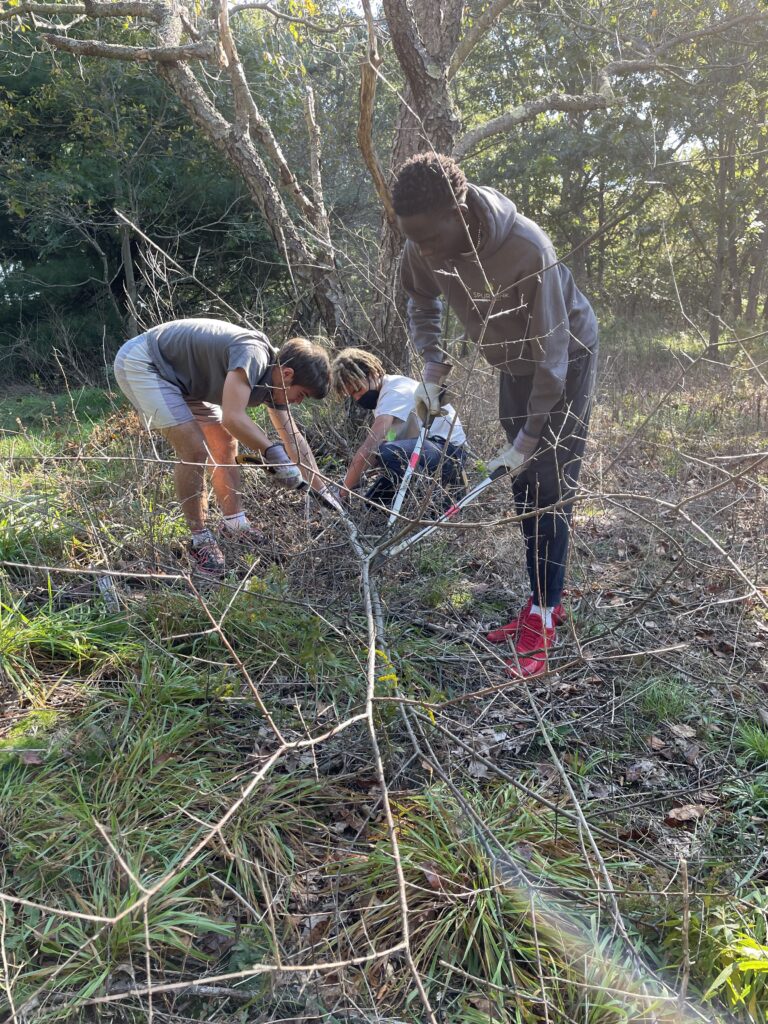
Waynflete’s Third Thought program receives significant grant from Unum
Waynflete has received a $50,000 grant from Unum to support The Can We? Project, one of several initiatives run by the school’s Third Thought Institute for Civic Engagement program. Grant funds will be provided over a two-year period.
The Can We? Project grew out of Waynflete’s commitment to diversity as a condition of excellence. The program empowers students to address the fractured state of our country and world by harnessing their unique capacity to engage in productive dialogue in the service of the common good. By cultivating empathy and the skills of dialogue across differences, the project helps prepare the next generation of civic leaders to address today’s urgent challenge of destabilizing and paralyzing political polarization. By asking questions for deeper understanding and being better able to recognize the humanity of others, Can We? participants learn how to create common ground on which to collaborate.
“Unum has long been recognized as a company that is committed to developing and supporting healthy communities,” said Third Thought Director John Holdridge. “In offering financial support to The Can We? Project, Unum‘s Inclusive Impact Fund has recognized that building empathy and fostering civil dialogue are all essential factors in creating a positive and hopeful future for everyone in Maine.”
The initial iteration of The Can We? Project brought together 30 students from seven high schools across Maine who represented a diverse range of backgrounds, political viewpoints, and life experiences. Beginning with a three-day weekend retreat, and followed by occasional collaborative sessions over a five-month period, students worked with experienced facilitators to learn how to talk across deep divides, develop a shared vision of a better Maine, and design an interactive forum with political leadership. Students were asked to question their own ideas, challenge each other, and collaborate. In the process, they developed basic democratic skills that seem lost in this divisive moment: valuing dialogue, mediating differences, holding elected officials accountable, and working collectively for a higher purpose.
“At Unum, we recognize the importance of giving back to our local communities,” said Cary Olson Cartwright, Assistant Vice President of Corporate Social Responsibility at Unum. “This grant to The Can We? Project is a meaningful step in Unum’s ongoing mission to work together with community partners and create positive change.”
With financial support from organizations like Unum, The Can We? Project will scale up over a five-year period, working directly with up to 1,800 students from 45 high schools across Maine. This work will be carried out in collaboration with Partner School Liaisons and individuals at organizations such as Narrative 4, Maine Policy Institute, Jobs for Maine Graduates, Maine Principals Association, Maine Youth Votes, and the Maine C3 Extended Learning Opportunities Network.
“This significant Unum grant is a clear indication that the program is resonating in the community,” said Waynflete Head of School Geoff Wagg. “There is a tangible benefit to creating opportunities for kids to learn dialogue skills. We’ve seen it with our own students. Now, with the help of organizations like Unum, we can extend this skill training to high school students across Maine.”
Activism in action: Anna Siegel ’23 travels to Washington, DC
Anna Siegel ’23 recently traveled to Washington, DC, to celebrate the 50th anniversary of the Endangered Species Act and advocate for further conservation legislation. Read more about Anna’s trip (in her own words!) below:
“Last week, I had my first day of senior year at Waynflete. Right after classes that Monday, I went to the Portland Jetport and left for Washington, DC with a blazer, business shoes, talking points on conservation policy, and a school bag full of homework. Once I landed in the nation’s capital, I explored the incredible network of buses and subways that makes up the DC Metro system before crashing at my hotel in the NoMa neighborhood.
I was in DC to represent Sierra Club Maine at an event hosted by the Endangered Species Coalition. This year marks the 50th anniversary of the Endangered Species Act (ESA), a powerful piece of legislation that has been instrumental to the restoration of the Peregrine Falcon, Humpback Whale, Bald Eagle, American Bison, and dozens more plants, animals, birds, and insects. The ESA was passed with bipartisan support and signed into law under the Reagan Administration, and it remains popular today. Polling has shown that 80% of Americans approve of the ESA. Yet, while there is much to celebrate about the ESA’s success in the past 50 years, we must fight to protect it so it can remain strong and continue preserving biodiversity.
38 pieces of anti-ESA legislation have been introduced in the congressional session thus far, and the ESA is starved for funding. With the proper resources, the ESA could do so much more to stave the current biodiversity crisis and combat the sixth mass extinction that is ongoing due to human-induced climate change and ecological shifts. The demands from the Endangered Species Coalition at this event were simple: Congress members need to oppose attacks and funding cuts on the ESA, approve increased funding measures for endangered species programs, and support House Resolution 195—policy introduced by Representative Neguse of Colorado.
The first day of the event was mostly filled with a training hosted by Defenders of Wildlife, followed by a symposium with some fascinating panels on the success and challenges of the ESA over the past fifty years. At the training, the group of Maine activists got together—myself from Sierra Club Maine, Doug Hitchcox and Ches Gundrum from Maine Audubon, Tara Thornton from the Endangered Species Coalition, and Halliday Moncure from Defenders of Wildlife—to strategize our messaging for our meetings with the Maine congressional delegation. A congressional delegation is the collection of Senators and Representatives that represent a state. For us Mainers, this delegation is Representative Pingree (Democrat, District 1), Representative Golden (Democrat, District 2), Senator Collins (Republican), and Senator King (Independent).
My second day in DC started at 6:00 a.m. to grab breakfast and coffee before speed-walking the forty minutes from the hotel to Capitol Hill. Our first congressional meeting was with Rep. Golden at 8:00 a.m., where we spoke with the Representative (and Archie, a golden doodle who is the pet of one of his staffers and hangs out at the office). Then we moved quickly to the Senate side of Capitol Hill for a chat with Senator King at his 9:00 a.m. “Capitol Coffee” hours, then a 10:00 a.m. chat with Senator Collins, then back to the House side for an 11:00 a.m. meeting at Representative Pingree’s office.
How these meetings tended to go:
- We waited in a lobby area, making small talk with staffers and exchanging business cards.
- Had a short meeting or photo opportunity with the politician themselves, where we quickly made our asks and told our personal stories or “narratives.”
- Had a longer, sit-down meeting with the environmental or conservation staffer of the politician, where we answered questions, concerns, dug into details, and left them resources to peruse.
Luckily, we got to meet face-to-face with every member of the Maine congressional delegation except for Representative Pingree, who had planned to meet with us until she unfortunately had to cancel due to illness. We did meet with her staffer, though. Each meeting was mostly positive, though we had to combat some misinformation around the efficacy and relevance of the ESA. Some other highlights were running into Senator Elizabeth Warren in the street as she was heading to a CNN interview, hearing Senator Cory Booker and activist Terry Teresa Williams speak at the ESA Awards Ceremony, and making some incredible connections with folks at the American Bird Conservancy and other organizations in the Endangered Species Coalition.”
125 years and counting: Waynflete celebrates its anniversary with special Founders’ Day treats
It’s Waynflete’s birthday! We celebrated our 125th year with a Founders’ Day celebration that included cupcakes for all students and employees.
Did you know that Waynflete’s founders, Agnes Lowell and Caroline Crisfield, sold the school to a newly formed corporation in 1923, assuring its survival beyond their retirement? It was a pivotal moment in our school’s history, and their commitment to Waynflete’s future allowed us to continue thriving and evolving. Today, we carry on their legacy of dedication to education and our school community.
Will Burdick ’16 returns to Waynflete
If you’ve been following our boys varsity soccer team this year, you might have noticed a familiar face behind the coach’s whistle. Waynflete alum Will Burdick has returned to the soccer field as the new boys varsity head coach. Read more about Will’s journey back to Waynflete at bit.ly/3rcdXSf.
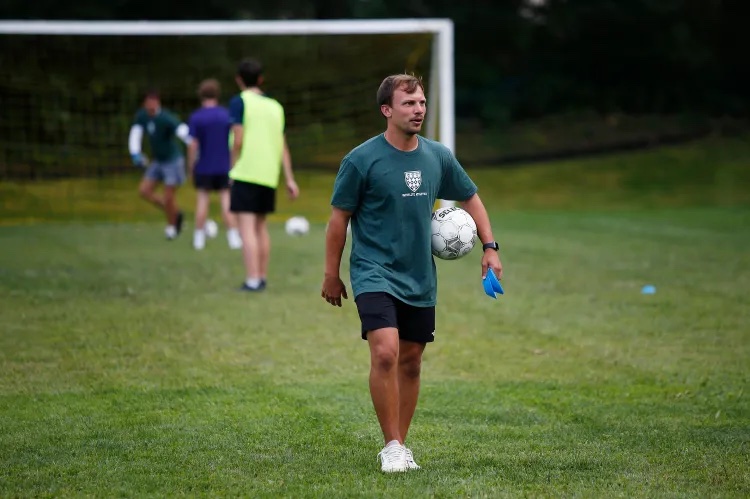
Creating connections: Can We? brings educators from across the state together
On August 24, Waynflete and Third Thought Initiatives for Civic Engagement welcomed educators from across the state for the Can We? Kickoff, a professional development event for Can We? Project partner schools. The Can We? Project is one of Third Thought’s outward facing initiatives, and it provides opportunities for Waynflete Upper Schoolers and other high school students to learn and develop the skills that enable them to create a dialogue across political lines and transcend other differences. 2023 promises to be the Can We? Project’s biggest year since its inception in 2018, and we are looking forward to working with approximately 300 students from 15 partner schools across Maine. For more information about the Can We? Project (and all of Third Thought’s initiatives), visit waynflete.org/community/third-thought.
125 years and counting: celebrating Waynflete’s impact
What a journey it’s been!
125 years of playful exploration, embracing innovation, nurturing students, and creating community. We hope you’ll join us in celebrating Waynflete’s 125th anniversary all year long.
A big thank you to Laura Felina at Felina Design Co. for her great work on the new mural!
